#also. if you see their dialogue and body language in both full scenes they act the same. like yeah they’re twins & they deserved better
Explore tagged Tumblr posts
Text




Elliot begging Nancy not to let the Annex take him (ep:08) Becky begging Nancy not to let Ben take her to the Annex (ep:09)
#chambers#chambersedit#elliot lefevre#nicholas galitzine#nancy lefevre#uma thurman#becky lefevre#lilliya reid#ft. ben lefevre's stab wound <3#ngalitzineedit#umathurmanedit#lilliyareidedit#m*#chambers*#something something sasha asking penelope if ben and nancy really treated them differently#the answer is they never stopped#also. if you see their dialogue and body language in both full scenes they act the same. like yeah they’re twins & they deserved better
13 notes
·
View notes
Text
god i hope you guys are ready for another crackpot theory, but this is now living rent-free in my head and it's time to pay up:
i'm now fairly convinced that crowley - and possibly aziraphale too - doesn't fully remember the fall.
because im rewatching s1 right? and this is what crowley said about adam and eve being exiled from eden because they ate from the tree of knowledge:
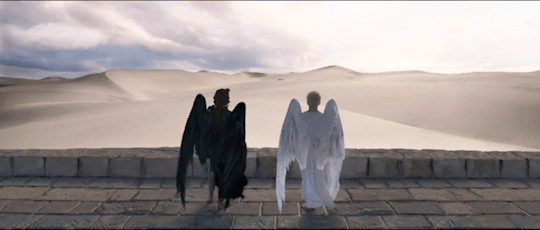
im sorry, but it's an 'overreaction'? that god would oust them from the garden - yes, for doing something she told them not to do - but for doing something, as crowley intimates shortly after, can't be that bad? and suggests deserved leniency, or mercy?
of course it's an overreaction! its completely bonkers! as bonkers as 'asking questions', or '[hanging] around the wrong people'! ie. presumably, if we assume crowley was telling the truth about why he fell*, this would have been his first offence. so why does he clarify that it's an overreaction because it was a first offence? and the offence itself (see next gif), as he suggests, wasn't even that big of an issue anyway?
if crowley truly did fall* for either or both of those above reasons, why on earth would he word it as an 'overreaction', and say it as if he's not sure? surely he'd sound way more bitter about it, as he tends to get later on in s1 and s2...?
if anything, to him, after the fall, it would make complete sense that god would react that way, that it was an overreaction. now, he could just be saying this to gauge aziraphale's reaction, true, but a) the body language and tone doesn't feel like he's testing aziraphale, he genuinely looks a bit clueless, and b) the way he goes on afterwards makes me think he doesn't yet remember the whole of his own experience in the fall.

isn't the whole act of falling meant to mean you are on the opposite side? the opposite of heaven - of Good? it literally posits the idea of there being a Good side and an Evil side, full-stop. crowley knows that there is a difference, and aziraphale too; they literally acknowledge this within their respective lines and being, by definition, a demon and an angel respectively.
so, given they've been through the fall, they'd surely understand the reason why knowledge of that difference is bad, right? they'd know why that knowledge is dangerous - it leads to conflict of literal, psychological, and spiritual proportions... so why don't they seem to acknowledge that understanding in this dialogue? why are they spitballing as to why humans knowing the difference is an issue? they'd surely know that it would - and it does, somewhat - spell for disaster.
it's almost like they've just become into being, an Evil Demon and a Good Angel, as if this is literally their very beginning. without much, if any, backstory to give them both context in this conversation. ie. why is aziraphale only guessing that "it must be bad...", when he's gone through the exact thing that makes him know why it's bad? because in his case, it led to the fall? to conflict? or, does he actually remember, but suspects in this scene that crawly doesn't?
now, im going to parse out some evidence, as i see it, in potential support, and countering, this theory.
they definitely seem to remember being angels, that is beyond dispute (allowing for hazy memory on both their and my parts):
crowley remembers building alpha centauri
crowley remembers (somewhat) discussing creating the concept of gravity
crowley remembers going into battle/war
crowley says "the angel i was is not me"
aziraphale remembers chucking his halo in the war
aziraphale says "you were an angel, once" (which is a little shaky but let's go with it) in s1
aziraphale says "i remember the angel you were"
aziraphale says "like the old times"
other things ive forgotten, no doubt, but you get the point - they must remember being angels at the very least, and also remember the war itself.
but, on crowley's part, we know he's a questionable narrator. to my mind (so this is biased as hell), i genuinely think this is part of his character and narrative makeup.
*im also going to plug an old meta from the pre-s2 golden era (and btw - humble brag - was liked by neil so im taking this to mean it's somewhat approved); his given reason for why he fell and how he fell conflict with each other. i originally sat on the side of crowley lying about why/how he fell, but now im more in the camp of him not fully knowing at all, and without god to give him answers, he's just guessed.
so was the judgement, his last judgement, if we go by this... was erased? well, if you go by my theory on the book of life (which obviously i do)... it kinda adds up. the only thing it contradicts is whether crowley fully remembers being an angel at all which has already been discussed by others, i.e. he does not. ill leave that up for debate.
but that crowley might remember his interaction with lucifer and co., and he had a propensity for asking questions, and assumed it was because of that... that he might remember diving into the sulphur pool (im not accepting "sauntered vaguely downwards", bc he said this in front of aziraphale), and crawling out into hell...
but. the bit in between? his actual judgement and sentence? the gavel on the block? god (literally) only knows.
(and aziraphale? his memory? im not entirely sure... but his perspective on the fall has been largely silent; mainly, i imagine, because he literally didn't go through it, and so has not really had occasion to talk about it. that doesn't support that he doesn't remember... but it doesn't negate it either. the only thing i would say is that, going by the BOL theory, he doesn't appear to have fallen... so if he does or doesn't remember, to my mind, is also still largely up for debate).
#good omens#this really is scraping the bottom of the barrel#congrats lads! we've hit theory-rock bottom together!!!🎉#the fall/the great war spec#pre-fall aziraphale spec#AWCW spec#memory wipe theory#book of life theory
44 notes
·
View notes
Note
Hiiii for the top 5 BL asks- top five favorite performances in a QL this year!?
Hiiiii :)
First spot is a tie, because both actors in this drama gave FANTASTIC performances and I cannot choose
1. Bright & Nonkul as Yai & Jom in I Feel You Linger in the Air

They gave everything! Joy, heartbreak, fear, desire - I felt it all and was completely immersed in their performances. Especial shoutout to the drunken poetry confession and heartbreaking goodbye sex scene.
2. Film Thanapat as Charn in Laws of Attraction

Film is one of my favourite actors. I am always floored by how his characterization shows throughout his eyes and his whole body - I watched this show because I loved Khun Chai, and I was blown away by what a different person Charn was to Tian. Before any dialogue or actions occurred, the body language, the eyes, the deranged smile - totally different person.
3. Gemini Norawit as Heart in Moonlight Chicken

I almost picked both Fourth and Gemini because I thought they both gave fantastic performances and stole the show, but I've already cheated once 😅. Heart's scene where he gets angry at his parents about how they haven't made any effort to communicate with him and how trapped and in pain he feels was wonderful.
4. Maeyama Kuuga as Tane in Bokura no Shokutaku

He took a character that, with a different actor, could have become very irritating and infused him with charm and warmth, becoming a highlight of the show.
5. Khaotung Thanawat as Gaipa in Moonlight Chicken

The funeral scene moved me very deeply. I really don't have much more to say about it, but anything Khao acts in he kills it.
Bonus 6. Fah Yongwaree as Jean in The Warp Effect

Not technically a QL, but I'm including her anyway because she was fantastic in this show! And it's pretty damn queer overall
Also bonus shoutout to Jimmy in Last Twilight, whose performance I'm enjoying immensely. It's very nice to see him shine, whereas his previous lead show had a weaker script and direction, which prevented him from really reaching his full potential. Film is also pretty great as Gee, but I think her best roles this year are in non-ql series like Home School
Ask me my top 5 bl anything for the year
#ql favourites#ql series#bl drama#none of the gls this year really moved me unfortunately#hopefully next year is better on that front#my favourite wlw couple this year was eung peung and maaey from ifylita#emilys fandom thoughts#bl favorites#ask game
10 notes
·
View notes
Note
(For the Pokéstar Studios AU)
Hey this is the same anon, I'm super happy that you liked the idea! Sincerely, I am extremely stoked, thank you so much!
This concept has been running through my mind nonstop ever since that ask and I have a few more ideas. Not to pressure you to add this in the fic or force these ideas on you, yet again I'm just having fun sharing these.
Anyways, Blake and Black brother-in-law moments REAL?! Whitley and White sister-in-law moments TRUE!? Ugh i'm eating up these hypothetical scenarios.
White most likely assigns Black to be Blake's bodyguard whenever he decides to go out, since he has celebrity status and all. The same thing goes for Whitley, though I see Blake accompanying her a lot too. So Black has to thirdwheel, not knowing it's Blake enacting vengeance for all those time he was the thirdwheel when it was just White, Black, and him at the BW Agency.
Also more of how I think Blake would be as an actor, though in this scenario he never received super spy training, he probably got super intense media training from White. They're both coming up with insane, genius, absolutely unhinged strategies to manipulate the media, Light Yagami monologuing typa bamboozlery. And Whitley and Black are just having a pleasant chat, side eyeing them every thirty seconds or so.
I imagine Blake's acting style to be refined, perfect, infallible that it's almost too much. Since he doesn't understand emotions, he studies, studies, studies, and studies. Writing down what his character would do, analyzing every line of dialogue, down to the body language and speech patterns etcetera. That's how he's able to nail so many different characters. AKA Christian Bale ahh acting style.
Now for Whitley, she's the opposite, she's new and unrefined, full of flaws. But full of emotion, her performances reaches out and captures. Delivering the feel needed for the scene and character.
And it really fascinates Blake, how she's so in tune with her emotions, making him kinda obsessed with her reactions...
That's it for now, I haven't even touched the surface for Blake and White's sibling dynamic but I sort of don't want this to be novel-length. Yet again, I am so happy that you accepted that ask! I really look forward to what you're cooking up, take as much time as you need!
Lil Bonus:
Blake: *trying to spook/fluster Whitley* Great job on set, your acting needs a little more work but you've got potential.
Whitley: Oh! Um, thanks...
Blake: You should learn how to be more confident, we don't want people to think you're easy to take advantage of...those rumors in Pokéwood are not to be taken lightly. *attempts to rizz* don't worry I'll-
Whitley: OH NO, w-were you a victim!?
Blake: Wh-what of course not-
White: *Bonks him on the head* Of course not! I made SURE that never happened to him, and I will DEFINITELY do the same for you!
ANON YOU ARE DRIVING ME ABSOLUTELY CRAZY W HAPPINESS W ALL OF THESE GREAT FANTASTIC Amazing Awonderf IDEAS, OFC I NEED TO ADD ALL OF THEM NOW <3 NEED TO GO TO SCHOOL SOON SO I'LL ADD MORE LATER BUT FOR NOW I WAS THINKING
Blake is studying Whitley right?!!! Almost out of a curiosity as to how she feels and experiences all these emotions?? So naturally!! Especially her beautiful eyes that get teary whenever shes thinking about something sad! He could study her all day!!
To add to that: Blake never had pets or cared for animals bcs you know... sociopath and all, but he starts seeing Whitley feeding a stray cat!! ANd EVENTUALLY (WHEN THERES SOME ANGST POINT) HE STARTS FEEDING THE LITTLE KITTEN HIMSELF just from seeing Whitley when he's walking by all alone!!
And you're so right he'd craft his image with the convoluted intelligence of Light Fucking Yagami lmaoo that's so good!!
AND UK WHITE IS THE MOST AMBITIOUS GIRL LIKE SHE'S MAKING SURE BLAKE IS TOPPING ALL THE RATINGS AWARDS WHATEVE, BUT her YOUNGER BRO ALSO ANNOYS HER SOMETIMES W HIS HEINOUS SOCIOPATHY AND SHE HAS TO DO DAMAGE CONTROL LMAOO (mostly it's him being with all sorts of ladies before being w Whitley and unintentionally breaking their hearts cus they didn't interest him for too long)
AND BLACK IS SUCH A FIERCE BODYGUARD BUT ALSO WHOLESOME!! LIKE HE WILL KILL FOR HIS BROTHER IN LAW!! BUT OFC OFC HE'LL GIVE THE FANS FREE FOOD AND GIFT BASKETS ON HIS BEHALF TOO AND HELP THE FANS GET BLAKE'S AUTOGRAPH especially he'll help anybody whose disabled bcs it's the right thing to do!! God he's so good
so yeah Whitley!! Whitley is pure!! Unfiltered!! And blake doesn't know what that's like aside from his family everybody else in Hollywood tend to be shallow and judgemental and fake!! But Whitley s not afraid to cry, to smile, to laugh, she's not afraid of what ppl think and guess what!! Blake needs that bcs he's been hiding his sociopathy all along! Bcs his career would be over if anybody revealed his diagnoses!!
Initially it started out as fun that he studied Whitley and tried to get emotions out of her!! Initially he just joked she was becoming an addiction! Just something to have!! But then things started to get real and he began to experience!!
Something big!! Something else!! Nobody had ever kept him that interested in his life!! Jumping from person to person!! Director to Director!! Everybody was fed up with him but then came in Whitley!! And this man just cannot let her go!!
And ya know Black is ready to defend his whole family!! He's outside of his work hours still doing his job cus that's what he should do!! Is Prez okay?? Where should we go next?? Lemme be with you Prez i cant risk anything happening to u not on my watch imma be the best bodyguard ever!! And Blake's just standing there like- "Bet"
ANYWAYS I SAID I DIDN'T HAVE MUCH TIME BUT I GUESS I HAD TO RESPOND HAHAHA, thank you so much this whole au and concept is honestly making my day and i can't wait to finish it!!
#pokespe#corruptedshipping#anon asks#trainer whi two#trainer lack two#trainer blake#trainer whitley#agency shipping#trainer white#trainer black#Blake thinks hes empty inside but Whitley tells him otherwise!#Tells him hes not an emotion zombie!! That all those things some people who knew his secret and judged him for were lies!!#Tells him he's real!! He doesnt feel the way others feel or think the way others think but shes there for him!! She understands him!!#alternate universe: pokestar studios
3 notes
·
View notes
Text
No Absolutes
A couple of cases where I've encountered counter-examples to my own usual taste preferences: 1) Usually I am all for more direct/literal translation over localization, as I tend to learn more about the original culture when it's not hidden behind proxy idioms (compare to reading Shakespeare). However, I recently watched a martial arts movie where the audio track was dubbed, but the subtitles seemed to use the more direct translation, so I got to experience both sides at once. And I kind of liked the "vibes-based" dub track more, where they seemed to look at the facial expressions and body language of the actors, and then back-formulated lines that fit those demeanors (and to fit with advancing the intended characterizations/plot). The subtitle lines by themselves didn't always get that narrative intent across as well, so there was more audiovisual synergy in the dub. However, this was a pretty basic martial arts movie, where the content of the writing matters less than the vibes. It's advantageous for the dialogue to not get in the way of the momentum of the film, on its way to action. Stories with more nuance have more nuanced acting, and work better with more nuanced writing to match. 2) I've been beating the drum on how outright boring I find most "custom to the footage" music scoring to be these days. Not only are insert song sequences usually far more dynamic, but there are also just too many iconic anime soundtracks to count, with their system of the composer sometimes never seeing the footage at all. I have now watched a couple of older series where the limits of this system are quite apparent. The concept art and descriptions were for high concept genre pieces, so the music turned in was for epic high fantasy and science fiction adventures, all huge orchestrations full of searing tension and rip-roaring bombast. Except, the actual shows they're accompanying are far more cognitive and down-to-earth, so you have long scenes of mundane conversations and subdued action soundtracked to manic and near-hysterical music. The fit is so poor that it goes past merely distracting (mismatched expectations) to actively detracting from the experience (counterproductive to the intended tone of any given scene). What I'm getting from both of these cases is, blockbuster/pulp type stories benefit from going all in on unrestrained "elements can stand on their own" vibes optimization. Discussion-oriented stories genuinely benefit from sticking more closely to the text. (But also, music composers should stop assigning certain music tropes to fantasy and science fiction so automatically.)
0 notes
Note
Honestly I think it’s really impressive that this was Erika’s first VA job. She did an amazing job and put a lot of emotion into her dialogue. Especially during the nightmare scene where Alex’s dad walks out. I legitimately got chills from her acting. Also holy crap True Colors introduced you to mxmtoon??? I’ve been listening to her for years and once I heard she was Alex’s singing voice I was immediately hooked on the game. Like I love the series but that just sealed the deal
YEAH OH MY GOD. Thank you for bringing this up because I haven’t even talked about Erika Mori’s performance in detail, but it was all I could think about after finishing the game and she did an absolutely incredible job. Like, incredible is a major understatement. I can’t praise her performance enough.
It just blows my mind that she was a COMPLETE newcomer! She wasn’t even a professional actor when she started and was just taking an adult acting class for fun when the casting director found her, and True Colors made it look like she’d been acting her whole life. They cast a total unknown, a complete newbie to the industry, and she killed it. Just give her her BAFTA already!
In LiS2 there are two moments I can’t listen to again: When Sean screams “FUCK!” after the desert encounter in “Faith” and when Daniel screams “WHY?!” in the Lone Wolf ending.
By comparison, in True Colors, every moment that I can’t listen to again (literally to the point where I will mute the sound if I’m rematching a scene) are Alex’s lines:
When Alex screams for Gabe after Ryan cuts the rope. Erika manages to convey so much desperation and despair: she’s both begging Ryan not to let Gabe go and also realizing that he’s likely already dead, and that she lost someone again.
When Alex cries at her mother’s bedside. There’s a lot of buildup and it looks so realistic. You can see Alex fighting back tears and struggling to speak and even breathe, so she can only nod and look at her dying mother. She wipes her nose with the back of her hand like a little kid and nods fervently, already so determined to keep her promise. And when she finally breaks, her sobs just sound so real. This is her truly grieving for the first time, and the way she clutches the pendant to her chest and curls in on herself is so heartbreaking. She just looks so scared and alone. Erika’s body language conveys just as much as her vocal delivery.
When Alex screams “DAD!” and throws the pendant. Again, the rawness and desperation in her voice and how high it got was so well done. And in the moments before, when Alex is whimpering and stammering “N-no, no, Dad…” and she can barely get the words out, that just sounded like a real, scared little girl.
When Alex simply screams at the foster home and breaks an entire row of windows. It’s full of white-hot, blistering rage and you can absolutely hear the years of pain and hurt behind that scream. Alex is unleashing all the frustration of not feeling wanted, of feeling off and wrong and broken, and it hurts, especially when she falls to her knees afterward and sobs while surrounded by broken glass.
Three out of these four are just in the nightmare sequence. It’s just hugely dramatic moments that hit you one after the other and that’s why it stuck with me so much. Not even the happy ending could fill that numb, empty feeling I had after finishing the game, because I couldn’t stop thinking about the nightmare, but that just shows how powerful Erika’s performance was.
But it’s not just the most dramatic moments. I loved that Erika was able to be so expressive as Alex, in face, voice, and body. Erika really runs the full emotional gamut and everything is so pure in their expression of joy, sadness, fear, rage, love, and everything else. Little things like the way she goes “WHOOO!!!” and does the victory dance when she wins the foosball game, her snort-laugh when Ryan says “Technically, they’re protected under the Migratory Bird Treaty Act,” everything about the entire USB plan scene (her damn facial expressions had me rolling), the shakiness in her voice when she convinces Ethan the monster can’t see him, and so many more. When Alex has her anxiety attack in the mine after the lamp goes out, the scene is completely dark and it relies entirely on Erika’s performance to convey that terror. Her performance somehow both feels effortless in how consistently amazing she was in every scene and so raw in how taxing it must’ve been to perform all those scenes. She was just amazing. Ah!
Also yes, I really had no idea who mxmtoon was before this game. Probably because I never use Tiktok… everyone I talked to who knew her music said they did because of “Prom Dress.” But I adore her music and I admire even more than she’s a young woman of color carving her own path in the music industry. She’s so open and proud of her Chinese heritage (from the music video for “Unspoken Words” to her wearing a qipao in “Bon Iver”) and bisexuality and it’s brought me a lot of joy and comfort and visibility, but she seems so nice and down-to-earth too!
#throughthiswindow#and this is why it took me forever to answer this lol#answered asks#erika mori#alex chen#mxmtoon#listc#life is strange true colors#lis
63 notes
·
View notes
Note
random question: if i were to write a monologue as Loki, what are some things you think i should include/keep in mind?
Hi anon! Thanks for coming to me with your question, that’s very nice of you! Please remember that these are all my personal opinions, and at the end of the day you’re entitled to your own writing/character opinions and style. These are just how I view Loki!
I have answered a somewhat similar ask before, it was someone asking for general tips on writing Loki. Here is the link to that ask, as it seems applicable :)
I also currently have a multichapter on ao3 that is like... literally all Loki monologue. If you don’t mind smut, that link is here (it actually updates tomorrow, and the second chapter is even more monologue-y than the first)! The whole fic is meant to be an insight into Loki’s inner monologue and general thoughts, so it may help inspire ya.
But otherwise, here is some general guidelines/rules/tropes I like to think about when I write Loki:
~Try to avoid contractions. Words like I’m are fine, but if you pay close attention to how Loki, Thor, and other Asgardians talk, that’s about the only contraction they’ll use. Try not to say you’ll, say you will. Isn’t becomes is not, haven’t becomes have not, etc. etc. A lot of Loki’s characterization comes down to the way he speaks because he does talk like someone who was raised in a royal setting. Loki is also highly intelligent, and while saying contractions DO NOT mean you are dumb or uneducated, when we catch all these little details about Loki and reflect them in our writing, he seems more in character and he plays into our stereotypes about what makes someone “smart” and what makes someone not.
~Don’t let your colloquial become Loki’s. I’ve said this before, but Loki was raised thinking he was a god. Therefore, he is not going to say “oh my god” in any situation, that wouldn’t make sense. I would also caution you from using cuss words liberally. Loki is the type to use words like fuck for emphasis, to assert dominance, to express unbridled anger. I think a lot of fans view Loki as someone who chooses his words very carefully, so if you reserve words that are seen as bad for specific situations, you’ll be able to draw more attention to the emotions Loki is feeling in that moment.
~Last point on language, I promise! I always try to incorporate fancy language into my (Loki) writing. Words that I find make him sound very posh or just otherwise like himself include: quite, wholly, pitiful, siege, relinquish, enchanted, believe, etc. etc.
~Don’t be afraid to over-explain! I’m not saying go Tolkien on your readers, but walk them through why Loki feels what he’s feeling or does what he’s doing. For example:
Furious, Loki scowled as you walked away.
There’s nothing wrong with this line. However, you could make it about essentially anyone. If you’re writing a monologue, internal or not, you’re able to characterize your protagonists. If you want to give more insight into Loki, you could do something like this:
Loki’s lip curled as you walked away. It made him furious to watch you, head held high in the air as your hips swayed. A mortal like you had no business being so confident - especially not while Loki was standing right there.
See the difference? Now, even though Loki isn’t narrating in the first person, the readers are fully aware of why he’s upset and how his own mind views seemingly neutral situations. Mind you, Loki doesn’t always have to be negative. I just like being dramatic, and I’m sure you know by now my speciality is angst. You can just as easily make this something happy.
~If you’re going to do the above, careful that you balance Loki’s internal emotional responses with external ones. The commonly accepted version of Loki is seen as a very cold and stoic man, one who doesn’t often let his emotions show through (I don’t see this supported by much source material, but that is the version of Loki fans like to see). That means you may want to sporadically add lines that convey the way Loki looks on the outside, if that makes sense. So if we take my previous point, we have:
Loki’s lip curled as you walked away. It made him furious to watch you, head held high in the air as your hips swayed. A mortal like you had no business being so confident - especially not while Loki was standing right there.
Now, if we want to offset that and let the readers know what, say, Thor or any other character sees while Loki is thinking that, you can just tack on an extra sentence or two:
Loki’s lip curled as you walked away. It made him furious to watch you, head held high in the air as your hips swayed. A mortal like you had no business being so confident - especially not while Loki was standing right there. Despite his anger, Loki contained himself, clenching the weapon he was holding in place of letting loose his tongue. Thor shot him a questioning look, trying to figure out what had just happened between you and his brother with little success.
Now we’re observing Loki’s actions through both his lens and someone else’s, making him overall a more three dimensional character and treading that line between Loki being a very emotional person, but not one who is outwardly so.
~Be dramatic! Thor and Loki and anyone else coming from Asgard are drama queens. They wear fancy clothes, they talk in Shakespearian-esque ways, and they all have a little bit of a superiority complex despite being very insecure (and that’s that on layered characters). So much of Loki monologues is about immersing your audience in the moment, and being dramatic really helps with that. Make things more high stakes than they need to be, throw in details like clenched jaws or sharp glares. Try to pull the readers out of this world and into your own, because Loki is that grand a character and warrants full attention. Even in just fic writing, he kinda demands it.
~Get into Loki’s headspace!!! This is the best advice I can give you for writing pieces from his POV. I’ve started to do something my beta introduced me to, and that’s creating Pinterest boards for your fics. It allows you to understand the vibe you’re going for, the setting your characters are in, and it just helps with organization and visualization. It’s also fun to direct your readers to! The other thing, and this is kinda weird, is that I act out the scenes I write. I think (no, I know) it has to do with being a former theatre kid. When you act out your scenes, particularly your dialogue, it can help clue you in on details you wouldn’t have noticed before. This includes the way your face contorts or your body’s physical reactions to thing (sweating, shaking, what have you). I find this also helps with the realism of your writing, because while you’re putting the characters in fictional settings, you’re giving them authentic human reactions.
I hope this helped a bit! Please let me know if it did. Also, I would love to read your completed piece. Send me a link when you publish it ;)
#ask#writing advice#writing help#loki#loki laufeyson#loki x reader#loki laufeyson x reader#loki imagine#loki laufeyson imagine
70 notes
·
View notes
Text
Ichijouji Ken, his future, and Kizuna
Having talked about Kizuna’s extremely deep relationship to 02 as a series, it’s only natural that I should probably spend some extra focus on its main central character, Ichijouji Ken. It’s no secret that, although Daisuke was the protagonist of 02, Ken was the central figure to the series itself (after all, the series was founded on the concept of deconstructing the supposed “genius kid”), and so Kizuna having such a deep relationship with 02 means that it does, inevitably, have a deep relationship with Ken in particular.
The last twenty years have been full of a plethora of meta analysis on Ichijouji Ken as a character within 02 to the point I feel anything I could possibly come up with would probably be redundant, so today I’d like to place extra focus on his development after 02 (in terms of both canonical materials and general analysis), and how it leads up to his portrayal in the recently released Kizuna. (Naturally, spoilers for the movie will be below.)
We’ll start this analysis by looking at where Ken left off during the final episode of 02.
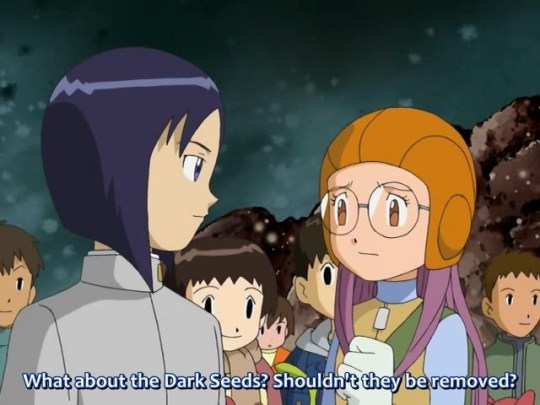
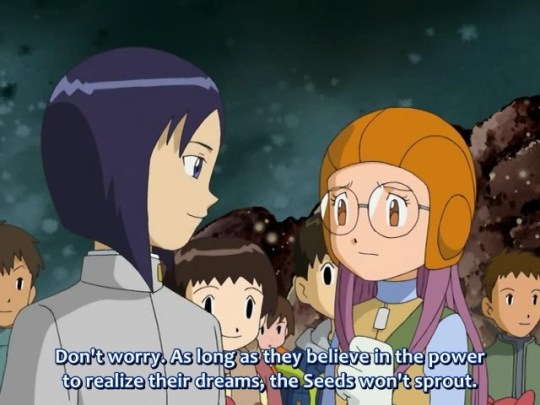
Thanks to his interactions with the rest of the 02 crew (especially Daisuke), Ken was slowly putting his life back together, but he still had a long way to go. As late as episode 49, we learned he still had suicidal ideation tendencies in regards to his deeds as the Kaiser, and although the rest of the team did get through to him in the end, it was clear that there was still a huge path ahead of him as far as coming to terms with himself and bonding with the rest of the team went. This was especially because he ended the series with the Dark Seed still in the back of his neck -- supernatural forces may have assisted his initial downfall, but it was going to be entirely on him to make sure that he never went back there again for the rest of his life.
One thing that’s really important to put in perspective is the actual chronology this ordeal took place in. Although the Kaiser saga spanned a little under half of the yearlong series that 02 was, Christmas skewed the schedule a little bit, so a good chunk of the second half of the series actually took place in much more condensed time than the first. Taking into account the official statement that everything before Christmas roughly aligns with the time of the year the relevant episode aired, and given the exact dates in December that we know episodes 38-50 take place in, within the course of 02, Ken’s reformation from being the Kaiser and bonding with the group spanned around only four months. That is not a lot of time, especially compared to the roughly two-year period Ken went through the trauma of his brother’s loss and his transformation into the Kaiser, so in actuality, Ken made a huge amount of progress considering how little time he had to do so.
Before we continue, I should make clear that I generally count pretty much everything in the Toei-esque fashion of “everything is canon, don’t think about contradictions too hard” (which is generally their modus operandi with pretty much any franchise), so pretty much everything here is fair game. That said, obviously, contradictions and other outliers do exist, so occasionally I am going to have to omit stuff that really, really doesn’t track...so for the sake of this analysis, I’m skipping Armor Evolution to the Unknown for two reasons: one, because it takes massive liberties with characterization for the sake of crack (it’s pretty hard to believe Ken would be this degree of flippant about the Kaiser persona in a more serious situation), and two, because it was written before 02 finished airing (it was released between episodes 43 and 44) and doesn’t reflect a lot of series and characterization development that happened later in the series. (Armor Evolution to the Unknown was released during a time period when the drama CDs were really, really big on the crack -- the three Adventure mini dramas are the same -- and it wasn’t until later that actual “serious” ones would start coming out.)
Given that, our next canonical point we can work with is Diablomon Strikes Back, which takes place in March 2003.

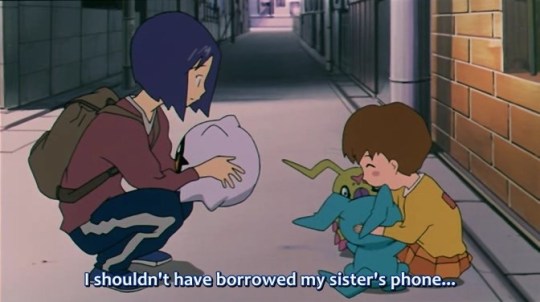
At this point Ken’s recovery is at a little around six months, and he’s making massive progress -- even if you’re not sure about counting the actual events of this movie as canon, it’s an excellent character study in terms of watching Ken’s emotional recovery at this point in time and his relationship with Daisuke, now that he’s not directly dealing with issues pertaining to his own past trauma.
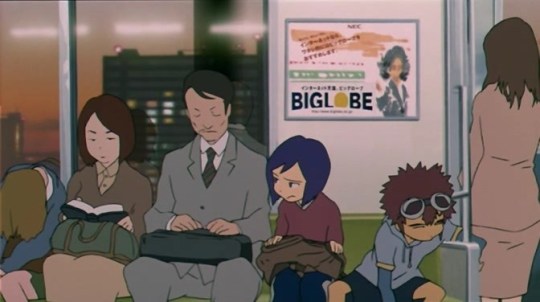
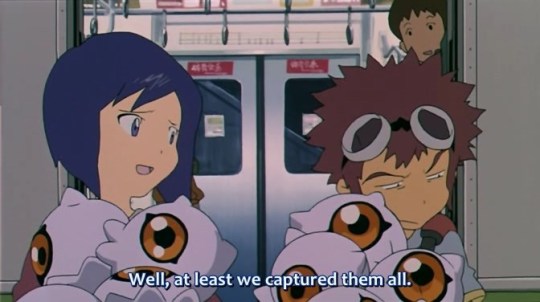
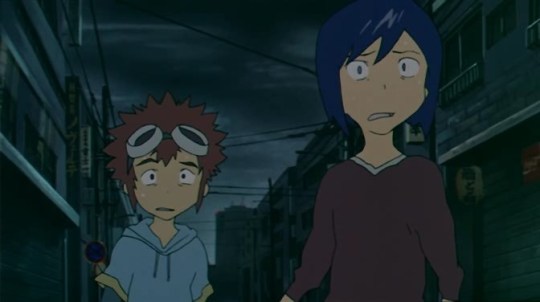
It’s already a very different Ken from the one we’ve seen in the original series, where in episode 38 the idea of him laughing was such a huge shock, but here we already see a much wider emotional range from Ken -- light cheerfulness, playfulness, and at times even a bit of petulance. His actions and dialogue still have Ken’s trademark “softness” -- being kind and gentle has always been said to be his core inner trait, after all -- but, nevertheless, he’s a lot more willing to show “superficial” emotions, especially compared to how closed up, shy, and sometimes standoffish he would be within 02 proper.
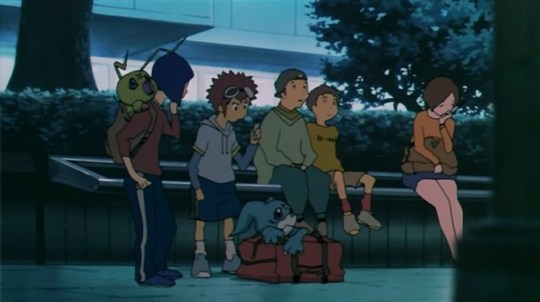
Even Ken’s own body language indicates a lot -- he’s much more relaxed and natural. Observe how he slouches here.
In fact, if you listen to Park Romi’s delivery of his lines throughout this movie, she voices him with a significantly higher-pitched and “lighter”, soft tone through all of it, which really gives off the impression that he’s much less emotionally uptight.
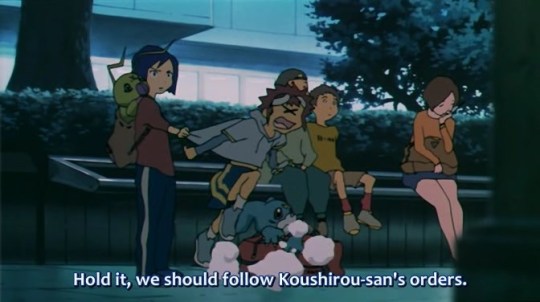
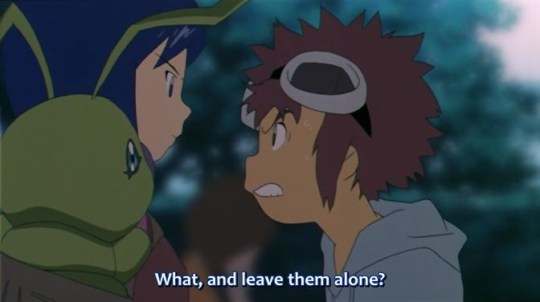
We get a glimpse of Daisuke and Ken’s future dynamic and how they’ll continue to be such tight friends in the future -- Ken is someone who can keep the infamously chaotic Daisuke in check (especially since prior to Ken coming into his life, Daisuke’s closest friend was probably Miyako, and while the two certainly got along very well with each other, they had a tendency to enable each other’s chaos a bit too much at times).
But despite Ken obviously trying to be more sensible than Daisuke here, it still manifests as a much greater show of emotion than the kind you’d be used to within 02 proper. He’s much more assertive with putting his foot down in keeping Daisuke under control, which indicates not only a more comfortable relationship with Daisuke in particular, but also a general increase in his ability to be assertive.
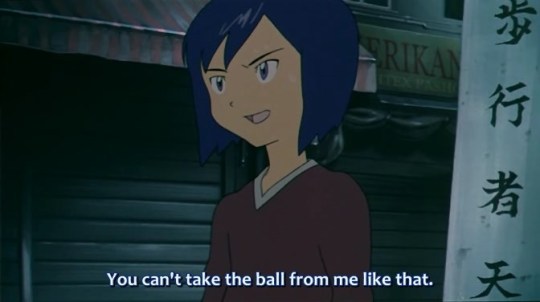
In one of his most famous scenes in this movie, he actually outright taunts Daisuke in order to spur him on. He’s doing it totally affectionately (it’s specifically to give Daisuke more motivation to keep running), but nevertheless, he’s taunting Daisuke -- not really something you'd expect from Ken in 02 proper. The original line in Japanese even has him use the very super-casual and aggressive end particle ~ze.
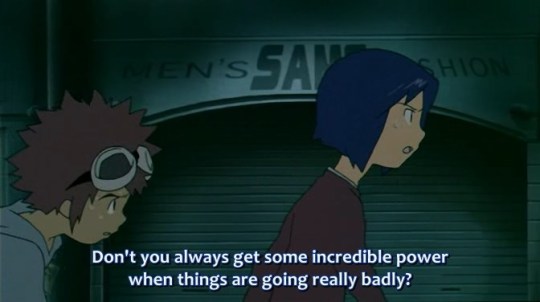
He even snarks about Daisuke’s convenient bouts of luck in ways that aren’t exactly complimentary (the literal phrasing of this line has “baka mitai ni” in it, in this context "some kind of ridiculous incredible power”).
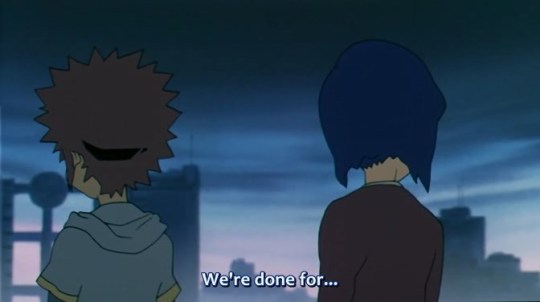
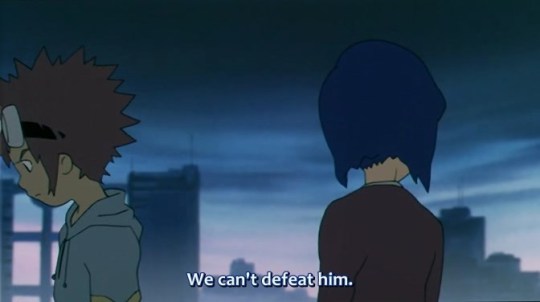
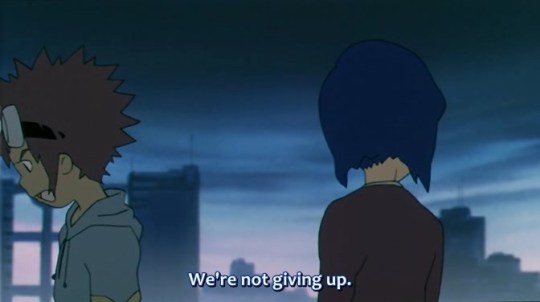
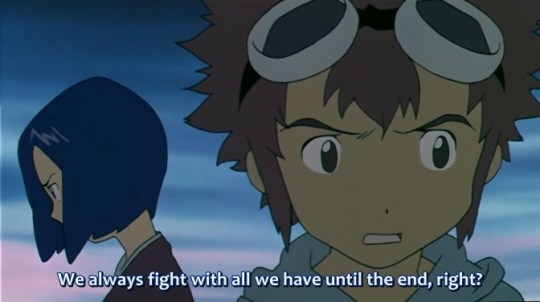
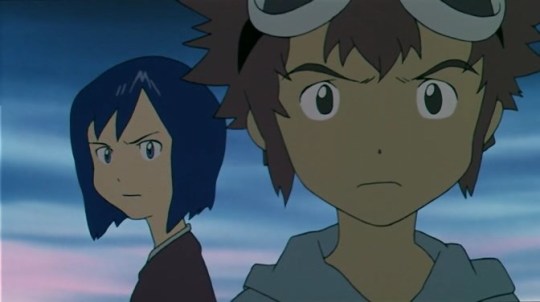
And, near the end of the movie, when he starts to lose hope, it only takes a single line from Daisuke to get himself back together -- this kind of thing would have probably taken a whole speech in 02, even from Daisuke himself, but by this point Ken’s got a much better emotional grasp on himself.
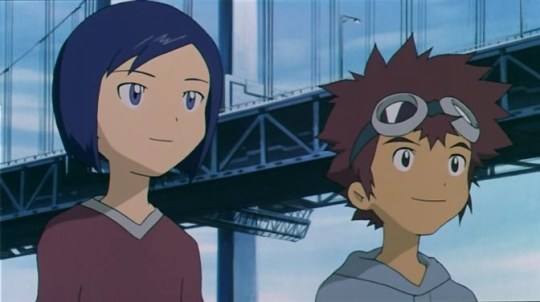
And in the end, the movie ends on both Daisuke and Ken laughing together -- very lightly.
It’s easy to pass off Ken’s characterization in DSB as an incidental thing simply because this is a “side story” movie from 02 -- especially since it was technically produced during 02′s airing -- but in fact, this portrayal is consistent with what Ken has to say about himself during his next known point in canon, Spring 2003.
Given that Takeru’s track is apparently set “three months” after Christmas, and Miyako’s track talks about having just entered middle school, I assume that this means Ken’s takes place in around late March or early April 2003 (almost exactly a year since 02′s start), but in actuality nothing really “happens” during Ken’s track. Nevertheless, it provides a lot of information on Ken’s state of mind during this time and his own self-reflection on his past...and defines in very clear words what it is that Ken needs to move away from.
You were always in a bad mood and you were cold to me, but now that I think about it, maybe you really wanted to be nicer to other people. I don’t know what happened to you that made you act like you did, but now, I finally feel like I understand a bit. You were demanded to grow up fast, weren’t you, Brother? Because we were always being evaluated and compared by someone, we didn’t get a chance to have more freedom. We didn’t have any chances to run down an alley because we felt like it, or pull up weeds, or tumble around… meaningless things, things that didn’t bring any value to us at all. Just like the cat napping on the roof… we weren’t able to fully enjoy any everlasting freedom.
02 -- especially its latter half -- dealt largely with the concept of parents imposing too many expectations on their children, acting “proud” of them but actually using them to inflate their own self-worth, and in the end effectively robbing their own children of their right to “be children”. While we don’t know a lot about Osamu based on limited information about him, Ken’s parents also lament that they might have robbed Osamu of the opportunity to be a “normal boy” in 02 episode 23.
Once Ken took the role of the “family genius” after Osamu’s death, Ken was thus likewise robbed of that “normal childhood” due to all of the expectations put on him -- and Ken’s words in his track imply that it extended to before Osamu’s death, because just because Osamu was the favored one at the time didn’t mean that Ken wasn’t subject to the same kind of expectations to at least some degree, even if not as much. (Note how he really didn’t seem to have any kind of friends at all prior to Daisuke and the others.)
Thus, Ken’s ideal trajectory is to become “a normal child” -- one not subject to expectations as a “well-behaved genius child”. That applies not only to things like his academic or sports performance, but also even his core manners -- being a “normal person” in this context meaning being allowed to show emotions, be petty, have emotional range that extends beyond just being deferential and polite, and generally do things because he enjoys them and not because others expect him to. This is consistent with his portrayal in DSB, as in said movie he really does come off as a “normal boy” -- a young child who, while certainly less chaotic than Daisuke, is still enjoying himself and interacting with the world in “his own” natural, relaxed way rather than holding himself to obligations.
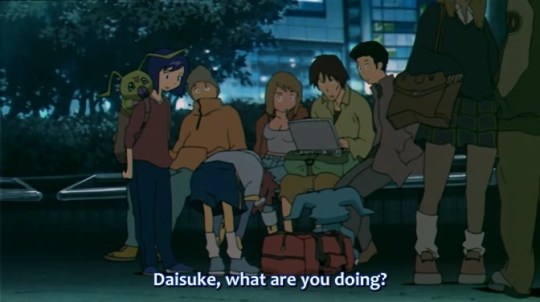
Another interesting thing about DSB is that it has Ken refer to Daisuke by given name. This is particularly intriguing because up until the end of 02, Ken consistently referred to Daisuke as “Motomiya” (he did use given name in episode 39, but it wasn’t something he really followed up on). This despite the fact he went with given names (plus honorifics) for everyone else in the 02 team, but it seems like Ken was still trying to figure out his very complicated feelings about Daisuke as someone who was his Most Hated Person™ during his Kaiser days and yet is now trying to aggressively reach through his barriers that he’s constructed out of self-defense.
And yet, extremely notably, almost every single post-02 material is consistent about the idea that Ken switches to given name basis with Daisuke after 02. (The only exception is Armor Evolution to the Unknown, which, as stated before, was written and recorded during 02′s airing and not after; notably, Daisuke is also on surname basis with Ken during that drama CD, even though he permanently switches to given name basis after episode 39.) That includes “out-of-hard-canon” things like Xros Wars episode 78.
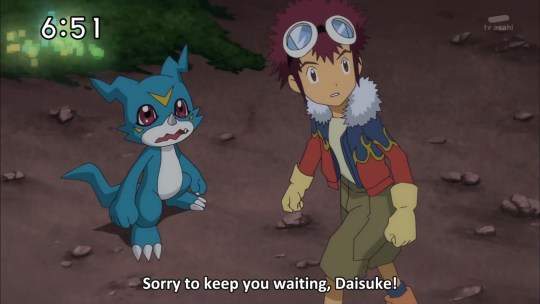
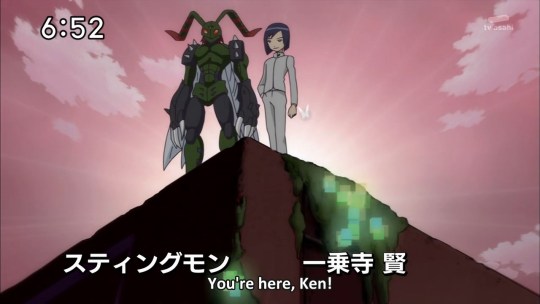
Yet they still couldn’t remember to put the highlight back in Ken’s eyes, among other things.
Honorific and surname-given name basis fluctuated quite a bit in both Adventure and 02 (especially whenever canon material changed hands between writers), but for all intents and purposes, there is no reason Daisuke and Ken should not be on mutual given name basis after 02. This is especially when you take into account the more naturalistic relationship they have as of DSB -- there’s no standoffishness at all between them anymore.
This ties very deeply into how 02 portrayed its characters. One thing I’ve very, very often pointed out was that it was always an explicit point of contrast between themselves and the original Adventure team was that the 02 kids were not only “friends” in terms of fighting together on Digimon cases, but “friends” in the sense of actual social-life friends who clicked well in personality and adored each other’s company. (Part of this was because of the core theme of the series; Jogress being such a huge motif, “understanding your friends” took precedence over Adventure’s “understanding yourself”.) These are the kids who hung out together in the totally-not-related-to-any-Digimon-incident (at least, not at first) picnic in episode 6 and Christmas party in episode 38, a stark comparison to the Adventure kids who infamously started drifting as early as Our War Game!.
(Note that this isn’t meant to diminish or drop shade on the Adventure kids’ bonds in any way -- I feel like their bond is more of one that’s a “transcendent” one that crosses space and links them through their shared experience, but, nevertheless, is simply not the same in nature as the “social life” bonds the 02 kids had where they were very casual and yet intimate with each other in almost all daily life respects.)
As a result, Daisuke and Ken’s relationship ended up very different from that of their predecessors Taichi and Yamato -- it’s actually hard to imagine them getting in all that many highly heated fights in the same way their seniors would be prone to, and they’d generally be on “mild banter” terms for most of it. In fact, they come off as pretty casual and in-sync with each other, and it’s to the point where it really does feel like -- especially by the point of DSB -- staying on “standoffish” surname basis really is unwarranted.
And while it’s tempting to limit Ken’s relationship to only Daisuke, this did involve the rest of the 02 group, after all -- we got significant episodes defining his relationship to the others (Miyako got a whole episode in 25, and 30′s entire events kicked off because of an attempt to get him to better socialize with Iori!), and the 02 kids as a cohesive “overall group” were integral in getting Ken to open up and show different sides of himself. Although his relationship to certain team members ended up closer than others (Daisuke and Miyako, the ones who tried most aggressively to reach out to him, ended up getting the most out of him), nevertheless, it was important that Ken ultimately cultivated a relationship with a group of friends, and not just one.
This, of course, brings us to Kizuna, which takes place in the summer of 2010. This is a massive leap of time we don’t know a lot about, and for all it’s worth, this means we have, compared to the approximately two years Ken spent suffering under the influence of the Dark Seed, a whole eight years dedicated to potential recovery. There’s a lot that could have happened during that time, and what happened in between, we can only really guess.

Well, for one, he cut his hair.
The reveal of Ken’s design for Kizuna was a huge shock for those watching, because, among all of the twelve main human characters in Kizuna, he probably has the biggest and most drastic design change -- especially because his long hair was so iconic that even the epilogue depicted him with it (and even longer, at that). Were it not for other important identifiers like Wormmon’s presence and the fact said hair is at least still indigo blue, you’d almost wonder if it’s the same character.
(I do have to at least give props to this Animedia poster, though -- that soft and concerned expression is textbook Ken-chan, so it absolutely nails the vibe that it’s the same character despite the massive design change, and it even has a small cute detail that, despite clearly trying to calm Yamato down in haste, he’s still tidy enough to lay his chopsticks neatly on the bowl. That Ken has a habit of doing this while eating hot ramen is a very specific minor blink-and-you’ll-miss-it detail in 02 episode 36, and while I’d normally pass this off as coincidence, Kizuna and its PR has had such ridiculous attention to detail that I’m not entirely willing to.)
Not only that, his actual outfit in the movie is rather unassuming -- it’s just a black shirt, pants, and a belt, compared to the more distinctive/fashionable or setting-immersive outfits everyone else has. I mean, it sure beats that godawful grey gakuran he was constantly wearing during 02, but there were certainly a lot of complaints about how...well, unassuming and plain he looks.
The thing is, though, this is very much in line with how Ken would most likely want to present himself. When you think about it, Ken himself would probably not really appreciate his fanbase status as the “sad pretty boy”; having been scrutinized, evaluated, and put on uncomfortable pedestals through all of his early life, “blending in” and coming off as an average, unassuming person would be right up his alley.
Anyway, before we get into Kizuna itself, we have the drama CD that came with its BD, Where Should We Go? While it was released after the movie, in chronological timeline, it serves as a slight prequel, and what we learn about Ken in it is certainly...interesting. Namely, that he’s apparently a hardcore fan of Japanese hot springs. And not just a hardcore fan of them, but also a complete nerd.
The hot springs *obviously* must have free-flowing water. If possible, I think I’d prefer a quiet, rural flowing hot spring that’s surrounded by a moss-covered garden. Then I want to stay the night at a historical inn that focuses more on tranquility and wabi-sabi rather than wildness or beauty. I’m not looking for a lot on the food options, but the portions should ideally be neither too large nor too small. If we’re just going to relax our bodies, then I’d like it if there was a variety of hot springs to choose from. The water quality that I recommend for the ladies would be the hydrogen carbonate spring or the alkaline simple hot spring (these are otherwise known as simple hot springs with a basic pH of 8.5 or above), but my personal favorite is the hot sulphur spring! Incidentally, the hot sulphur spring is said to treat arteriosclerosis and high blood pressure. If it were possible, I’d like to take my time there… At least stay for two nights! Ahh… Hot springs… Hehehe…
I cannot stress enough how much the audio delivery for this depicts him as being terrifyingly into it. It’s also...not exactly the most fashionable thing for a nineteen-year-old to be into (actually, it’s more of a stereotype old man thing, what with the fixation on traditional Japanese aesthetics and health nut aspects), but we have Ken being very shameless and assertive about his personal interests, even if they’re a bit unusual.
Funnily enough, this isn’t actually the first time he was demonstrated to be a huge infodumping nerd -- it’s just that the last instance was questionably canonical, but tracks extremely heavily with what was just demonstrated here. Namely, Daisuke and Ken’s Shopping Carol:
Listen, the thing about Christmas is that it's one of the most important days in the world... It was the day the Savior was born... So, you go to church and pray... Of course, you knew all of that right?
Or in other words, he interrupts Daisuke’s wistful thoughts with The Actual Nerd Facts, because he’s a nerd. He even has a bit of a smart-aleck atmosphere...and then he cheerfully and sassily dumps all of the work on Daisuke thereafter. While the canonicity for this song is hard to place since it was released during 02′s airing (and 02 itself depicted a very different Christmas), plus the ambiguity of character song canon in general, it’s interesting how Ken’s portrayal here is pretty surprisingly in line with what we’re learning about his future personality.
The rest of what we see of Ken in the drama CD is what we generally knew about him already -- he’s kind, he dotes on Wormmon (he even indulges Wormmon’s request to take him skiing!), and he still keeps up with being into intellectual studies, and even soccer (he’s described as actually keeping up with soccer to the extent he does training camp), because he was always interested in those kinds of things -- it’s just that now he can indulge in them in ways he personally likes instead of being held to other people’s standards.
But he’s also very emotional, passionate, and openly assertive -- something he could be in 02, but only when it was something he really, really cared about, because most of the time he was a little more on the shy side with others. Not anymore. And he’s happy to indulge in the chaotic trip planning and enable the others, and, at the end, gives some sentimental words to Daisuke, his best friend.
Anyway, onto the movie itself!
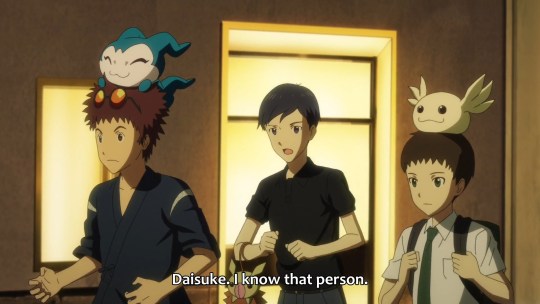
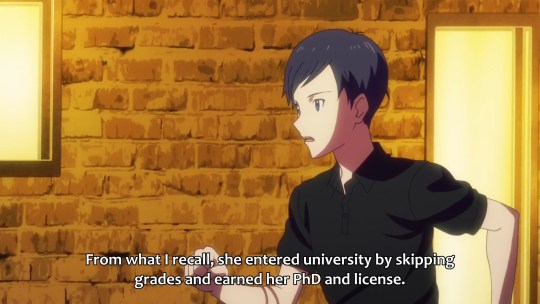
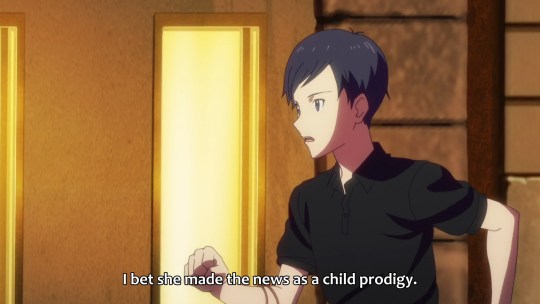
Notably, they do not mention Ken’s past trauma nor his deeds as the Kaiser throughout the entire movie.
That might surprise people, given that this was...well, central to the entire plot of 02, so it’s arguably a glaring omission that despite having the 02 cast here, it’s not even brought up once. The only real “reference” to it is this scene, where Ken happens to be the one who knows about Menoa’s background as a child prodigy -- and even then it’s uncertain whether this had anything to do with said traumatic events (Menoa was admitted to Liberica in 2002 itself) as much as it’s a meta nod to Ken having a suspiciously similar background and the fact he and Menoa were based on the same real-life story (the nine-year-old boy who skipped grades into Columbia University).
But, again, recall that Ken has had eight years to move on from the events of 02, more time than said events had actually spanned over. That doesn’t mean he’s easily going to forget that trauma, nor that said events don’t still have an impact on him, but rather that a true positive development for him should have him not having to consciously dwell on it if it’s not necessary, and that his friends of now eight years should probably not be still holding it over him at a time like this.
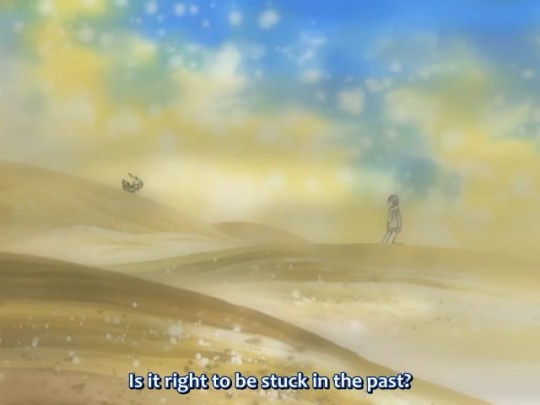
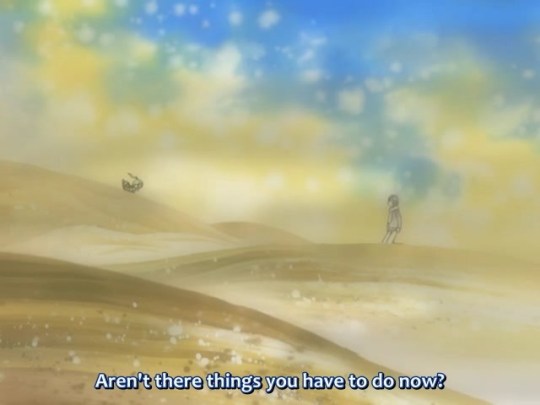
After all, 02 itself was dedicated to scolding this kind of behavior -- not being “stuck in the past” (which, well, also happens to be a very pertinent theme when it comes to Kizuna...) was basically the entire point of the latter half, and so it stands to reason that Ken, and by extension the rest of the 02 cast, would be more focused on what they’re doing now instead of what happened back then.
In the absence of any references to said past, Ken in the actual movie ends up coming off as a bit unremarkable and plain compared to the three friends who end up surrounding him, all of whom have much more extreme personalities (the chaotic and exuberant Daisuke and Miyako, and the comically poker-faced Iori). But you get the feeling that he’s perfectly fine being that way -- rather, he’s enjoying getting all of his fun from his exciting friends, without feeling a need to spice things up himself.

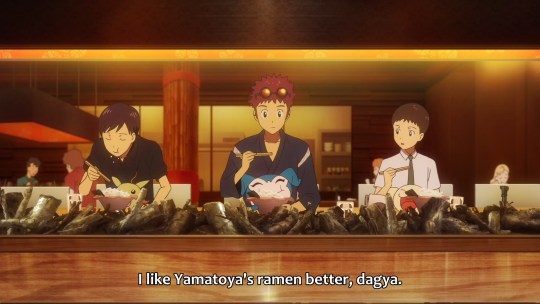
So when we finally do meet Ken for the first time in Kizuna, he’s cheerfully eating ramen with Daisuke and Iori in New York (which, for all it’s worth, is probably really questionably legal, considering that Adventure’s world of 2010 likely still hasn’t figured out how to deal with that whole thing with “immigration and customs” as it pertains to Digital Gates.) Emphasis on cheerfully. He’s as tidy as ever (note how he still properly keeps his chopsticks between his fingers and cleans up after himself, albeit not as well as Iori), and he’s obviously more straight-laced than Daisuke or Miyako, but he isn’t really hiding the fact he’s also totally enjoying this. He didn’t even know why they were there for ramen in New York in the first place, but he just rolled with wherever Daisuke took him.
Recall that, according to their official profiles, these three go to completely different schools now -- Iori’s in high school, Daisuke’s at vocational school getting a chef’s license, and Ken’s in university studying psychology. (Which, by the way, is not brought up at all throughout the movie nor the drama CD! It’s easy to glean how his past experiences might give him an interest in the topic, and it’ll certainly be a valuable background to have for his future known career in criminal investigation, but despite Ken previously having had a reputation for being studious, it’s not brought up at all -- almost as if hanging out with his friends and having fun with them is more important and pertinent.) The drama CD even points out that Ken would normally be busy with soccer training camp. Yet they’re hanging out. In New York. Eating ramen. So, Yamato, what were you saying about how “choosing your own path can sometimes mean being alienated from friends”? If anything, these friends seem to be going out of their way to make sure they’re staying tight.
And, as you’d expect, Ken refers to Daisuke by given name, following DSB’s precedent. Again, given the nature of their relationship right now, this should be expected. There’s other evidence that Kizuna does use DSB as reference in certain other respects as well (Takeru calls Yamato “niisan”, which had previously been exclusive to that movie), and it’s very possible that Ken as portrayed in that movie was used as reference for his potential trajectory here.
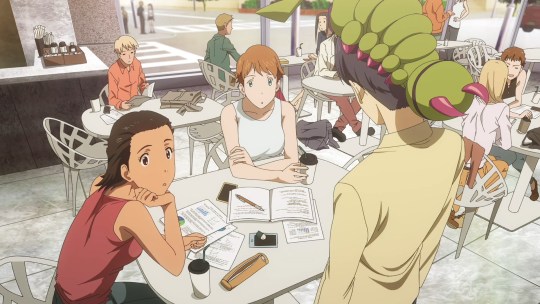
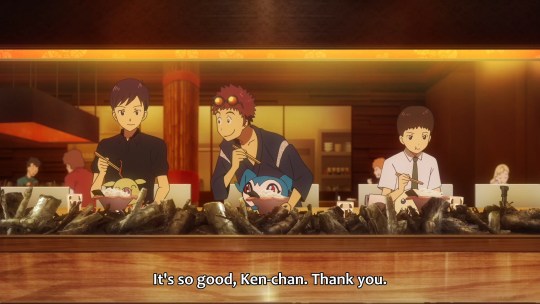
Note that he seems to be even more outwardly affectionate with Wormmon than before (which is, shockingly, apparently possible) -- he still feeds his partner before feeding himself (similar to what he did in 02 episode 37), but now he also shamelessly carries Wormmon on his head, which he never did in 02. Perhaps it’s because he’s tall enough to carry the weight, but unlike with Takeru and Patamon, Wormmon is big enough that the sight is honestly comical -- yet Ken couldn’t care less, and while we don’t see him in his own school, it’s a sharp contrast to how Taichi and Yamato scoffed at the idea of bringing their partners to school because they “have their own lives to live”.
(A nice touch is Ken carrying Minomon from his arm, which actually comes from a very obscure piece of 02 concept art -- you can find it in the Character Complete File or the Animation Chronicle -- but was never depicted in the series proper. The Kizuna design works in the April 2020 edition of Animedia actually recreated that piece of art with Ken in the exact same position, only as a nineteen-year-old this time, which was an incredibly welcome thing to see.)
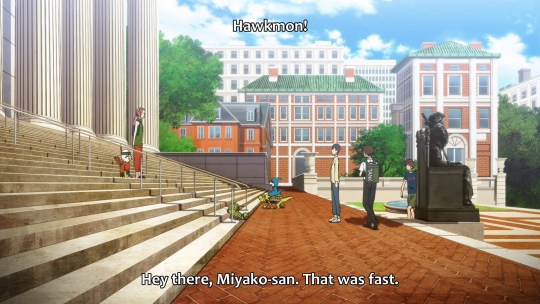
He greets Miyako upfront when she arrives, which doesn’t look like much on its face, but recall that this probably wouldn’t have happened during 02 proper -- not even with Daisuke! -- and, at the very least, not with this very casual “hey!” tone. It means a lot in terms of how much more casual of a person he’s been able to become in the last eight years, and how much more casual he is with this group (well, at least with Miyako). Takeru also greets Wormmon in the drama CD, and Wormmon seems pretty unusually happy to see Hawkmon when they meet each other there, certainly implying a lot of interpersonal interaction since.
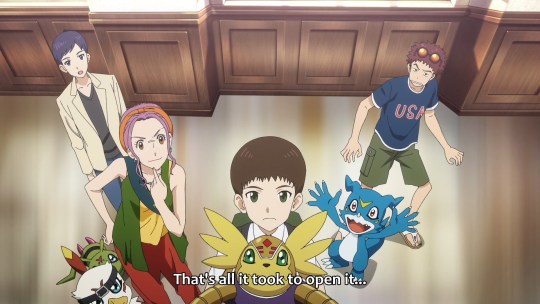
Miyako meets up with them (and, going back to how tight these kids are, Miyako would come in all the way from Spain to meet her friends even for the exact same job that she dumped on her seniors), and they end up infiltrating Menoa’s office. He gets in a line of snark, especially because the Shueisha Mirai novel indicates he’s deliberately “looking the other way” in regards to worrying about security -- looks like he’s developing some Lawful tendencies, but in the end, his friends and getting to the bottom of the real truth take priority.
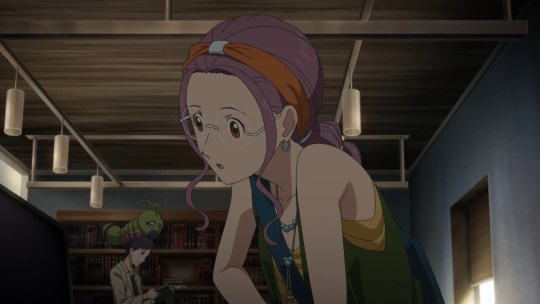
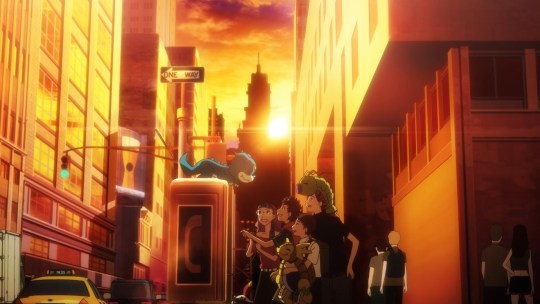
And, also, it’s still pretty clear he’s totally taking the opportunity to enjoy this.
So what does this all mean, really? He’s taking a fairly passive attitude with his abundantly more chaotic friends, but he’s also not protesting, and he’s enjoying everything he can out of it. He’s a bit quieter than he was in DSB, but that could easily just be from being older and a bit more mature, and he hardly comes off as reserved, either (it helps that Daisuke doesn’t quite resort to any antics nearly as ridiculous as he did in DSB, so there’s no need to keep him in check -- yep, even Daisuke got a bit more mature himself). And he’s joining these kids in being possibly some of the most chaotic disaster adults (near-adults?) on this planet, in a sharp contrast to their seniors.
I mentioned earlier in my analysis of Kizuna’s relationship to 02 that Ken is actually a “hidden” foil to Kizuna’s main antagonist, Menoa -- they were both conceived from the same idea Producer Seki had regarding the real-life “genius boy” who ended up going to Columbia University at a young age and, in her opinion, was going to be robbed of a proper childhood experience. 02′s Dark Seed children arc was a major indictment against parents forcing this kind of pressure on children, not only in the sense of pushing them academically but also quashing out their more “childish” dreams for the sake of a more “dignified” outlook and future. Through the events of 02, Ken learned a very personal lesson on not losing his “true self” to the pressure of those expectations, and the meaning of valuing his family and friends instead.
Ken and Menoa, effectively, were originally on the same path, but thanks to the circumstances of 02, Ken managed to avert Menoa’s fate and ended up following his own way. Nevertheless, Ken was largely robbed of a normal kid’s childhood up until the age of eleven, and it stands to reason that, even at the age of nineteen, he might still be trying to make up for all of those fun experiences he never was able to have.
Funny thing about his haircut, too -- this isn’t the first time Ken’s had this haircut, actually. You know when was the last known time he did?
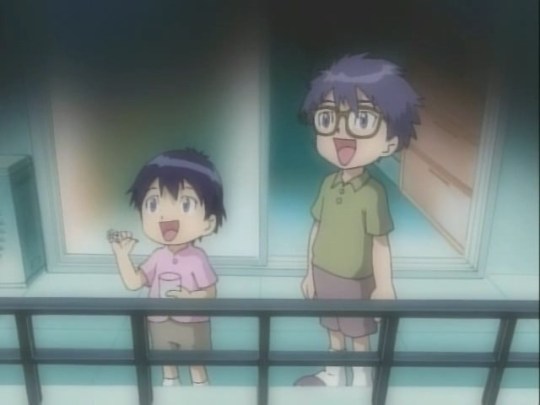
Hm. Coincidence? Maybe. Maybe not.
But unlike Menoa, who decided that it would be better to trap herself in her own distorted view of what “childhood” is, or Oikawa, who ended up clinging dearly to the last reminder he had of what he’d lost from his childhood, Ken ends up dealing with it in a very forward-facing manner. In fact, he’d elucidated his feelings on the issue back in Spring 2003:
There are still a lot of times when I think about how I should have “done this back then.” But I discovered that there are many things I can do over afterwards. I’ll stop counting the things that I can’t do. Because I’m sure there are many things that I can do.
Instead of living in regrets about the past, Ken simply chooses to move forward by making new fun experiences and memories with his friends, befitting those he couldn’t have when he was a kid, and perhaps even enhanced by his newfound freedom as a nineteen-year-old.
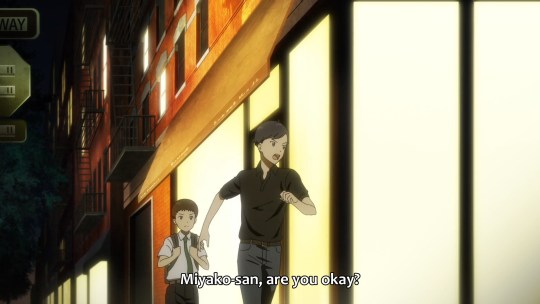
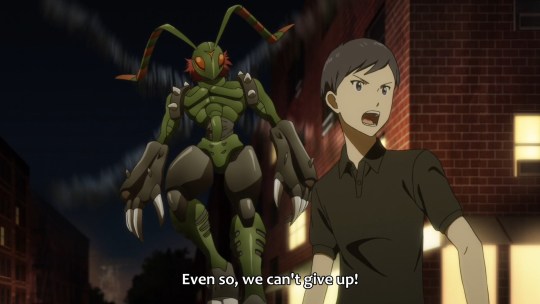
During the final battle, we get a few more emotional and assertive shows from Ken -- his concern about Miyako is pretty frantic-sounding, and the fact he steps in so quickly and frantically to help her out by his own will is pretty impressive. And then he definitively declares that they can’t afford to give up -- which is certainly in line with the nobility he had even during 02, but remember when, even in DSB, Daisuke had to be the one to remind him of this? Now he’s the one reassuring his teammates about this, all on his own. When it all comes down to it, his sense of awareness of what he wants and what he wants to do is stronger than ever.
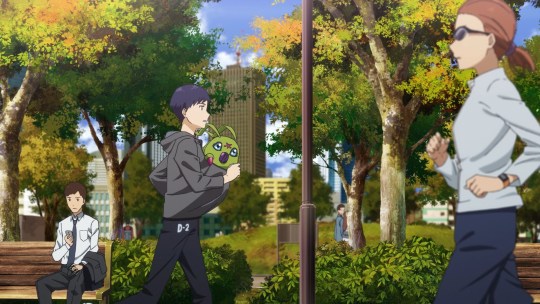

I mentioned in my analysis of Kizuna in relation to 02 that the 02 kids are in a fairly unique position in the movie, thanks to having already practically gone through a lot of the lessons in both 02 and Kizuna, thus leading them to become very lacking in susceptibility to potentially losing their partners anytime soon (and in fact are deliberately portrayed as such). I would say of all of them, Ken is the most representative of this -- being such a direct foil to the movie’s main antagonist, one who actually came dangerously close to making some of the exact same mistakes she did and emerged with his own trauma as a result, the lessons and warnings imparted by the movie are already deeply embedded in his being.
He’s one of the most openly affectionate and intimate with his partner, having already learned the very, very hard way of what happens when you don’t treasure your partner properly. (He’s taking Wormmon jogging with him, which has got to be an awfully uncomfortable setup, but, goddammit, he’s gonna make it work. And if ~With~ is to be believed, he’s been doing this for years now.) He’s still got a Dark Seed in the back of his neck as an eternal reminder to remember who he is, and to acknowledge the love from his family and friends around him instead of succumbing to arbitrary societal expectations. Remember what I said in my earlier analysis about the true reason for partnerships dissolving, and how deeply it was tied to throwing yourself away for the sake of arbitrary standards of adulthood? Ken’s experiences and extremely painful trauma are like a giant do not do this stamp on his face, and although everyone in this cast is naturally human and may have ups and downs or relapses, Ken is possibly one of the last characters one could imagine succumbing to that kind of mistake again.
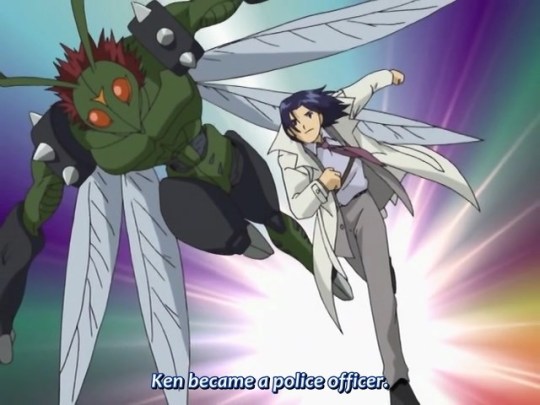
So we make it to the epilogue, and although Ken’s technical job title as given in the epilogue is literally “police officer” (keisatsukan), his form of dress (plainclothes, not uniform) and his the Character Complete File indicate he’s from the Digimon Special Investigations Unit (tokusoubu), or, in other words, he’s actually a public-servant detective. (So no, the various dubs also going with “detective” are thus not “changes” in this respect.) In short, he investigates scenes of crimes after they happen, and the Character Complete File provides an example in the form of him investigating a dead body found at the river.
This is probably why Kizuna has him major in psychology, because forensic psychology would be a pretty useful skillset for this kind of job, and a university education in general would most certainly be helpful. (The job requirements as per the Japanese system also require a very high level of athleticism and aptitude.) On the other hand, considering what we know about Ken up to Kizuna, there aren’t any indications that he treated this like any kind of major aspiration, and the psychology major makes you think he might have just fallen into this career by a series of accidents -- he took an interest in psychology (and mental health) due to his own experiences, and then decided that “discovering the truth behind things” was up his alley (much like Iori). Even more notably, his position isn’t really described in any history-making terms, not even ones like being “the first” of anything (like Jou), and it feels like he’s doing this to contribute to society in a way he prefers more than he’s trying to accomplish anything world-shattering.
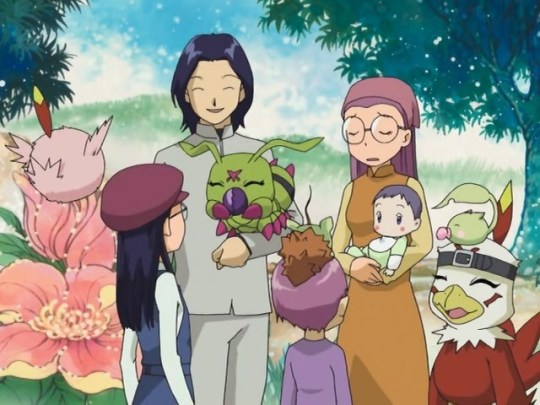
But on the flip side, it’s probably no coincidence that the 02 epilogue portrays him with such a big family. Of course, it also fits with his and Miyako’s family backgrounds (they’d probably want their kids to have siblings, given their own experiences), but since the Dark Seed was described as having its effects countered by acknowledging how much you’re loved, Ken is clearly surrounded by love -- his wife is one of the most openly affectionate people out there, and his kids (or at least his middle child) use the same “Mama” kind of affectionate language Ken shared with his own parents. Once the events of 02 came to a close at the end of 2002, Ken went on a journey of discovering his own self-assertion, personal desires, and fun -- shedding the expectations and societal standards others had of him, and learning to enjoy life in ways he personally enjoys, for his own sake.
#digimon#digimon adventure 02#digimon adventure last evolution kizuna#ken ichijouji#ichijouji ken#shihameta#kizuna spoilers
127 notes
·
View notes
Text
Put On Your Raincoats #17 | The Erotic Reveries of Rinse Dream

Cafe Flesh opens with a title card orienting us to its post-apocalyptic setting. After a calamitous apocalyptic event known as the "Nuclear Kiss", the world is made up of 99% "Sex Negatives", and 1% "Sex Positives". The Sex Negatives can't have sex and can only watch. The Sex Positives escaped such a fate, but are instead forced to perform for an audience of Positives for their vicarious enjoyment. There are many such venues but the one we spend the movie in is the Cafe Flesh of the title, a nightclub where the decor and patronage evoke a cross between punk rock and retro-futurist aesthetics and a hint of Rat Pack era cool. A smarmy comedian in a white tuxedo introduces the sex acts, which are elaborately staged performances that play almost as genre parody with their tongue-in-cheek choreography (plenty of costumed grinding, as with a performer in a rat costume early on, and mimed thrusting, as with another performer in a pencil costume in a later scene) until the turn into the real thing with the requisite close-ups. Futuristic jazz reminiscent of Angelo Badalamenti's music plays over the proceedings.
This serves as the background to a story about a woman who may or may not secretly be a Positive (played by scream queen Michelle Bauer and, in certain scenes, a body double) and the impending arrival of a legendary Positive performer known for his virility (a towering, square-jawed Kevin James, introduced in black sunglasses and an oversized blue suit). We also get a sense of the tensions in this nightclub ecosystem, particularly between the heroine and her boyfriend, a new performer, the comedian, the owner (who puts the comedian in his place in one scene by having him cruelly recite "the rhyme"). (The comedian is played by Andy Nichols and the owner by Tantala Ray, both of whom played interview subjects in Gregory Dark's Devil in Miss Jones two-parter, which leads me to believe the latter was influenced by this movie, as Nichols in particular doesn't have many screen credits.)
This movie apparently was a bit of a success in the midnight movie circuit, and it's not hard to see why, based on the strength of the mise en scene and the performances. The cool, smoky backgrounds of the reaction shots provide a nice counterpoint to the avant garde looking performances and give the highly stylized setting a nice evocative quality. There's also a level of genre commentary here, as the story ultimately is about the heroine's agency over her pleasure and the roles sex performers are forced into by greater society, ultimately imprisoned by their own abilities. Truth be told I found the performances got a little less enjoyable when they got down to business with the penetration and whatnot (it gets harder to pull off inspired choreography when one of your appendages is stuck in another person, or vice versa), but I also think it's necessary for those themes to resonate.
Cafe Flesh was directed by Stephen Sayadian, credited as Rinse Dream, and he'd previously used that pseudonym on Nightdreams, for which he co-wrote the screenplay. (The director was Francis Delia, who went on to a career of directing mostly music videos and television, while the other writer was Jerry Stahl, known for his memoir Permanent Midnight, as well as writing for shows such as ALF and movies such as Bad Boys II.) This movie similarly concerns agency over female pleasure and is about two doctors (Andy Nichols and Jennifer West) conducting experiments on a mentally ill young woman by inducing erotic dreams and monitoring her brainwaves. There's a dream involving a giant, monstrous jack-in-the-box. There's one with a pair of cowgirls and something other than a gun stored in a holster, with the cowgirls spouting stilted dialogues in robotic monotones, a Sayadian trademark of sorts. Wall of Voodoo's cover of "Ring of Fire" plays over the action (I'm not sure if they paid for the rights, but Delia and Sayadian did direct videos for the band). There's one with a group of bedouins sharing a hookah and then her. There's a giallo-esque scene involving a masked assailant, but this happens after an aborted nightmare about a shrieking man with a hollow chest from his pants emerges a shrivelled up, monstrous baby. Did David Lynch jack off to this? I wouldn't rule it out, folks.
There's a scene where she blows an anthropomorphic box of Cream of Wheat, while a jaunty cover of "Old Man River" plays on the soundtrack and a man dressed as giant piece of toast dances and plays saxopohone. An IMDb user review cites this scene for its cutting racial commentary, but I found this tonally jarring with the rest of the movie. After this, there's a trip to hell where a demon and his minions subject her to such horrific tortures as prodding her with a giant claw and then an even more fearsome double-pronged contraption. The scientists argue over fears that they gave her too much stimulation. ("This woman's on the brink of an orgasm. Let her enjoy it. She doesn't need interruption from a man." "You call it orgasm. I call it breakdown.") The movie then makes way to its final set piece, involving fog, a background of blue sky and pillars and soft piano music. The cinematography in this scene is in stark contrast to the mostly shadowy, intimate imagery of the previous scenes, with the camera pulled up to admire both their bodies and the scene continuing for some time after the climax. It almost brings to mind a certain scene in Jerry Lewis' The Ladies Man that I found disarming in its stylistic and tonal break from the rest of the movie. Without revealing too much, the film's coda sets the record straight.
It probably doesn't say anything flattering about me that I found most of this pretty hot. The movie has a tinge of horror running through it, giving many of the sex scenes (especially the one in hell) a real tension, while the scientific framing device gives it a cold, calculating quality reminiscent of David Cronenberg. (Alas, this doesn't predate some of his most influential films, but for all we know, David Cronenberg jacked off to it as well.) A few of the character names (Mrs. Van Houten, Mrs. Chalmers) make me suspect that Matt Groening might have seen (and jacked off to) it as well. This is pure speculation on my part, but as far as I'm aware, none of them have denied it either. The movie's distinct tone is grounded in an impressive lead performance by Dorothy LeMay. I wasn't all too impressed with her work in Taboo II, but here I think she skillfully evokes the heroine's derangement and "erotic trauma", in the words of the scientists.
Sayadian and Stahl collaborated again for Dr. Caligari, a relatively mainstream effort that also found some success as a midnight movie. I say "relatively" because it's still pretty fucking weird. The movie positions itself as a loose sequel to Robert Wiene's classic The Cabinet of Dr. Caligari, this time about the granddaughter of the original Caligari conducting illegal experiments in an insane asylum. From the earlier film it pulls a German expressionist influence, but combines it with a campy, MTV-inflected style to present the asylum as a warped funhouse. The dimensions of the architecture are distorted and full of odd angles, decorated in a mixture of pitch black and gaudy day-glo colours (lots of yellow and pink costumes). This is not a pornographic movie, yet it's hardly less obsessed with sex, as the villain's plan concerns the weaponization of female pleasure. There's also the occasional grotesque sexually-charged image to spice things up, like the sight of a woman with giant, phallic-shaped breasts. Some of the imagery also gives it potency as horror, like an oozing sore or a cake full of intestines. There's a lot of strange, stilted dialogue, as in this exchange:
"Describe your life in three words or less."
"Un-ending torment."
"Elaborate, please."
"Blankety blank blank."
"Thank you for being specific."
This is matched by the angular body language of the villain, played by Madeline Reynal in a deadpan yet very physical performance. This movie also brings into focus a voyeuristic theme, which was present in those earlier movies but didn't seem quite as confrontational in its presentation. A character utters, basically to the audience: "I know you're watching me. I feel your eyes like wet fingers touching me in special places." (This is a line of dialogue that appeared in the next few films I'll talk about.) Truth be told, I was a little exhausted by the sensory overload of Sayadian's style here, and in retrospect appreciate the way the sex scenes act as a counterpoint to his more aggressive tendencies in his more explicit films. But at the same time, this is full of memorable imagery and has a weirdly compelling lead performance. I don't know if there's much else quite like it (or at least operating at this force), so it gets a recommendation.
Sayadian followed up Nightdreams with a few shot-on-video sequels. I skipped Nightdreams 2 as I could only find it in a heavily degraded transfer, but I did make time for Nightdreams 3, which has a self contained story that's essentially a more explicit if relaxed version of Dr. Caligari, once again concerning a doctor conducting sinister experiments at an insane asylum. (This time her experiments mostly involve just fucking her patients and other staff.) There's more of the stilted dialogue, even closer to non sequiturs than they were in the earlier film, with the music by Double Vision providing an off-kilter soundscape to match the weirdness of the dialogue. (Highlights include "My pussy's like an erotic assassin" and "I happen to know she has a thing for longshoremen. Just mention On the Waterfront and she gets randy pants.") The video imagery quite frankly is pretty ugly, with the green carpet and purple drapes that decorate the set looking especially ungainly, yet Sayadian seems aware of this, as when he uses video's flattening effect to create a crude facsimile of a split diopter shot. The video collage style he adopts meshes uneasily with the plot, as if to call out its meaninglessness, giving the whole thing a slight MST3K vibe, especially as characters speak directly to the camera.
Some of these tendencies are honed to a more pleasing form in the two-part Party Doll A Go-Go!, where we spend time with a number of attractive, shapely women in bright coloured lingerie as they spout '60s-inspired dialogue at the viewer in between scenes of copulation. (Not all the dialogue is '60s-tinged, however: "They're overcome with retro wordplay...Us modern girls prefer synthetic future".) Like many pornographic films, this is a collection of loosely related sex scenes, but Sayadian's construction turns those genre requirements into parody, having his characters offer colour commentary (albeit channeled through his campy prose) on their own scenes and even getting interrupted by the stars of subsequent and preceding scenes. The number of quotable lines is even greater than those earlier films, and I admit I was scrambling to write down the choicest ones as there were so many. The best lines go to Jeanna Fine, who also has the huskiest voice and the most penetrating stare, so she was easily my favourite. I certainly was not unmoved when she insisted that she's "never run around buck naked and bubbling for man-winky" or "never wrapped[her] lips around a throbbing johnny". (She does not, however, deny having ever interacted with beef bologna.) Or when she asked the audience "Was I a bad girl?" (said three times in rapid succession) or if we've "ever seen a double orgasm on videotape?" (She adds "Watch, pornhound" and "Calling all porndogs, watch me work, uh-huh.") And I definitely wasn't unmoved when she demonstrated her talents on a dildo dangled in front of her (which she refers to as an "artificial man-thing", a "chubby rubber fella" and a "flying princeton"). No, definitely not unmoved.
There isn't much of plot here, except in the latter half when one of the girls can't stop "the wiggle" and needs to be rescued with an emergency injection of "boy jerky". Sayadian, once again bringing voyeuristic concerns into focus (the characters all talk to the camera), seems to be satirizing the very idea of porn having premises and certain their lazy execution. Even the production design is transparent in its chintz (the movie is shot entirely on the same set, with the bare minimum in alterations to the set dressing to make it look even slightly different), while the video images, which feature lots of Dutch angles, zooms and whip pans, match the campiness of the whole affair. This is probably a little long at a combined 2+ hours, but at the same time, it settles into a nice groove and is full of really attractive and reasonably charismatic actresses delivering amusing dialogue and indulging in "girl homo" (sometimes "big time girl homo") or getting "boy jerky". I don't have much interest in delving into '90s pornography and shot-on-video productions strain the dignity one can feel while trying to watch pornographic films as actual movies, but I'm not gonna pretend I didn't have a good time with this.
#film#put on your raincoats#movie review#rinse dream#stephen sayadian#francis delia#fx pope#cafe flesh#nightdreams#dr. caligari#nightdreams 3#party doll a go-go!
14 notes
·
View notes
Text
Watching ‘A House Divided’ from Trollhunters again and, as I think is the typical reaction, feeling super frustrated by it. It a different frustration the second time around though, with the sting of betrayal less of a shock and having had time to process it properly.
Because that scene in the kitchen, where Merlin talks to Jim about becoming half troll? That’s actually a really good scene, Merlin’s not perfect in it, but the writers have made it clear that they wanted him to be a flawed, morally grey kind of character, not a mentor. The body language, the dialogue, the voice acting - it’s also super solid, and makes for a very poignant moment.
The problem is that it’s so heavily overshadowed by that dang fight scene between Merlin and Jim that precedes it. That scene is so harsh and unpleasant, Merlin beating Jim effortlessly as Jim desperately tries to go save his mom, who is the most important person in his world. It makes it almost impossible to see the kitchen scene at its full potential without pausing the episode, walking away for a bit, and then coming back to it, and that’s just not how TV shows are meant to be watched.
Having thought about it, and with the advantage of hindsight and not being on a deadline, here’s what I would have done differently: Similar set-up, Jim wants to rescue his mom, Merlin doesn’t want him to. Instead of Merlin giving a flat, “No, this needs to happen, this is one thing you don’t get a choice in” sort of response as he does in canon, however, I’d have him issue a challenge. “You want to save your mother? Very well. But you have to get past me to do it, because if you can’t do that, then you won’t be able to defeat Gunmar or save her.” The entire fight could probably go almost exactly the same from there, up to and including much of the dialogue, but that little bit of extra framing would strengthen it so much, leave the viewer in a state of mind where they could appreciate the kitchen scene better, and leave Jim’s ultimate choice at the end of the episode feeling far more like the choice it’s meant to be.
Ideally, I’d also like to see Merlin mention that fighting Morgana... isn’t really not an option. The solution that’s protecting the world from her is and always was a temporary one - she will get out eventually, it’s just a matter of when it happens. Allowing her to be released now, at least it’s happening vaguely on their terms, allowing them preparation and at least some control over the situation. However, I will acknowledge that one of Merlin’s big character traits is that he simply can’t be bothered to explain his actions to anyone around him most of the time, so it does make sense that he wouldn’t do this.
Aaaaaand this is probably all old news to everyone in the fandom, since this episode came out literal years ago, but whatevs, I just got here in August and I have both Opinions and a pressing need to share them, so. (shrugs)
52 notes
·
View notes
Note
Hey there, can you pls help a fellow writer? Here's the thing: I've been writing T70S fanfic for a while, and I feel that I'm managing to keep the characters in character, writing dialogue and their thoughts is easy for me now, but I'm having a whole lot of trouble with their body language.
For instance, when Jackie's really happy or excited about something, she claps her hands enthusiastically, smiles and gives those small adorable jumps. I've seen her doing that on the show and I try to bring that to my stories, but I'm having trouble writing her body language in other situations.
And that's a problem I'm having with all the characters. Like, I know Kelso and Eric both tend to gesticulate a lot with their hands when they're excited about something, but I don't know how to write them when they're scared, or sad, etc. Does that even make sense?
Anyways, I have no trouble writing about the character's feelings, I do have trouble when they need to express their feelings with something other than words, usually, their body language.
I want to give each character their own unique way to express themselves through their body. Like, Hyde and Eric, for example, will behave differently when they're like, really happy or really sad.
Hyde is not the type of guy that claps when he's really excited about something, he's a chill guy and he's the one I struggle the most to write when he's experiencing a strong emotion.
What I mean to ask is: can you give me some tips? I'm really struggling with this. Sorry if this was way too long, I don't even know if this ask made sense to you, but... well, I just could really use some help.
Hi! For my own T7S stories, I’ve made specific choices for the characters’ (emotional) body language based on my understanding / interpretation of who they are, and you can do the same. You’ve obviously observed quite a bit from the actors’ performances from the show, but I’ll describe body language you might not have spotted.
Jackie
She displays a variety of behaviors when she’s sad or upset, depending on what lies underneath her sadness. It also changes depending on her life experiences (basically, how many times her heart has been broken and by whom). You’ll find some commonalities in her body language when she’s upset, however.
When she feels hopeless or is grieving, she stays relatively still, sitting in one spot. She’ll hug a pillow or pick at a stuffed animal’s ear until her feelings overwhelm her. Then she’ll full-out cry while continuing to stay in one spot and picking at whatever she’s grabbed for comfort. See “Ski Trip” (1x13).
As she experiences more heartbreak, her stillness remains when she’s upset. She’ll stare off into the distance while crying. But unlike in “Ski Trip,” she sometimes cries silently. See “Kelso’s Serenade” (2x21).
When she’s depressed, she loses affect in her voice. Her movements are slower. See “Jackie Moves On” (2x22).
When she’s fighting to be understood -- whether she’s angry or sad or wanting desperately for someone to do something specific -- she becomes animated. She makes pleading gestures with her hands. She’ll also place her hand on her heart.
When she’s fighting for her life -- her emotional life / happiness -- she’ll let snot run down her face while trying to get the other person to understand her needs. See “Don’t Lie to Me” (7x12).
When frustrated, she’ll slap her leg, slam a door after leaving a room, or even kick or pinch the other person. (No! Bad, Jackie!) See “Nobody’s Fault but Mine” (5x23) and “The Immigrant Song” (5x24).
When annoyed or disgusted, she’ll grunt or lean her head back -- or do both at once. With Eric, she’s also sneered. (Too many examples exist to list a specific episode.)
When she’s trying to coax someone to doing what she wants, she’ll do a subtle shoulder shimmy (which I bet she picked up from her mom). She’s done this with Hyde and, I think, Donna. See “Kelso’s Serenade” (2x21) for an example with Hyde.
When she has a sudden idea she thinks is important, she’ll gasp and put her hand on Donna, Kelso, or Hyde’s knee (depending on whom she’s talking to).
Jackie will rub a person’s knee or arm as an expression of emotional support. She’ll also lean her temple against a friend’s (or lovers) when she’s feeling affectionate toward them.
Honestly, I could keep on listing body language for her. But you can find it yourself by watching the episodes. Find an episode where Jackie experiences a specific emotion you’re looking to write into your own story and see how it’s portrayed. This advice stands for the rest of the characters, but I’ll list some body language for them, too.
Kelso
When he’s scared, he closes in on himself physically, trying to make himself a small as possible. He also shakes while doing this. Or he’ll scream. Or he’ll shove someone -- even a person he supposedly loves -- out of the way to get himself to safety. He’ll also find someplace to hide if he feels it’s necessary, usually under a pierce of furniture.
When he’s sad, he’ll cry. Sometimes he’ll hug something with sentimental value to his chest, like a photograph while crying. Or he’ll rip apart something symbolic of how he’s feeling, like a cookie shaped heart.
If feelings of anger or loneliness are mixed into his sadness, he’ll sometimes cry but it’s less forceful. He’ll slump to the couch.
If he feels particularly betrayed, he won’t look at the person who hurt him while in that person’s presence, even if they’re talking to each other.
When anger and betrayal mix, he’ll get physically violent -- usually, but not always, to his own detriment. He’ll run into a screen door then yank it off its hinges. He’ll shoot someone with a BB gun, etc.
When he’s confused, he often stares blankly with a strange expression on his face.
Eric
When he’s scared, the pitch of his voice rises. He’ll swallow more. Sometimes he stutters. He’ll fidget. He’ll look from side to side. He becomes hypervigilant of his surroundings.
Eric often expresses his anger either directly or passive-aggressively. When direct, he’ll shout his feelings and thoughts or speak them at a louder volume than normal. He’s not particularly cruel in what he says.
When passive-aggressive, he’ll smirk smugly while or after making a sharp insult. He’ll rest his hands on his hips or hook his hand / thumbs in his pants pockets in between gesturing. He’ll also laugh smugly while sticking out his tongue then blow a raspberry. This last sequence of behavior seems to be one he and Hyde share, so maybe one of them picked it up from the other while growing up.
If frustration is mixed with his anger, he’ll shout and shove furniture around.
When feeling a particularly overwhelming emotion, whether pleasant or unpleasant, he tends to get on the hood of the Vista Cruiser and look up at the sky. If deeply upset, he might cry silently and slam his fist onto the car’s hood. See “The Promise Ring” (3x25).
After making a devastating choice he believes is right but breaks his heart, he’ll shove his hands in his pockets, look down at the floor or his shoes, and stay quiet. See “Love, Wisconsin Style” (4x27).
The quality of Eric’s voice often reveals a lot about his emotional state. He’ll speak really quietly, not whispering, but as if trying not to scare away a doe when delivering bad news.
Fez
Fez is relatively open and direct with his emotional expression. When he’s sad, he cries. When he’s angry, he shouts. When he’s hurt-angry, he might cry-shout. When he’s happy, he might sing a song and/or do a little dance. Or he’ll hug and kiss his friends (male and female) when he’s grateful.
He’s generally not afraid to speak his mind. If his feelings are particularly intense, he’ll demonstrate his emotional state with a physical display (e.g., ”You dump Fez? I dump fries! There’s your scene!”)
When he’s scared, however, he sometimes pulls in emotionally to protect himself. He won’t speak his mind. Or he’ll clasp his hand in prayer, look up, and ask God for help or answers. He might disregard another person’s boundaries to feel safer (see “Ski Trip” when he’s cold). On the opposite end of the spectrum, he can become obsessive (e.g., calling Eric at three in the morning to ask if they’re still friends).
Fez tends to keep his hands on his hips a lot, regardless of what he’s feeling at any given moment. It’s one of his characterizing personality quirks.
Donna
When she’s angry, she can yell her feelings or an insult (or both). Or completely swallow her anger and talk / act as if she’s fine. She’ll stomp away after an argument, whether up a flight of stairs or to her yard. In season 3, she also takes on a quality of becoming emotionally distant and dismissive, which is reflected in her body language by maintaining a physical distance while looking the other person squarely in the eye.
When she’s sad, she’s doesn’t tend to cry. She’ll talk about what’s upsetting her with emotion in her voice. She’ll gesture with her hands or bite her thumbnail. If she’s discussing her feelings with Eric, she’ll hug him.
When she’s depressed, her posture slumps.
When she’s terrified or feeling betrayed, that’s when she’ll cry. She might reach out to the other person (Eric) with her hand.
Donna tends to act out and/or become self-destructive when she’s feels powerless. Her body language gains a swagger (her walk, her facial expressions, her tone of voice).
If she’s happy, she’ll gesture in excitement with both hands. She smiles and laughs, too, while explaining what’s made her happy.
Donna will hug friends and family to show emotional support.
Hyde
Hyde does not like people knowing how he’s feeling at any given moment, whether it’s happy, angry, sad, etc. But he does express emotion through body language.
When he’s nervous and he’s sitting, his leg might bounce or his foot will shake. More often, though, he’ll cross his arms over his chest protectively. This latter behavior is true for many of his emotions.
He’ll pace when he’s conflicted. Or stand still and pinch the bridge of his nose while considering all the variables of his internal conflict. He’s very careful when speaking or purposely revealing his (emotional) truth, and he might take a few breaths before actually saying it aloud.
He’ll also pace and scratch the back of his head he’s antsy or edgy.
Generally, though, he tries hard to suppress his feelings. This often makes him stand stiffly with his arms dangling still at his sides.
When he’s amused, he doesn’t hide it. He’ll chuckle or laugh. If he’s very amused, he’ll laugh hard and press his hands against his stomach. If he’s laughing that hard with a friend, he’ll hold onto that friend for support while lowering his head.
He’s rarely happy, but with Jackie he is. His joy beams out of him like sunlight. See his private moment with Jackie at the start of “Magic Bus” (6x03) and the circle scene with Jackie in “I’m A Boy” (6x08) for examples.
He’ll hug his male friends when they’ve been gone for months or they’re about to leave for a long time. He’ll also hug Kitty and Red when he feels happy for or grateful to them.
That being said, he doesn’t like when people hug him spontaneously. Depending on who’s doing the hugging, he’ll either shove them off angrily (Kelso, Fez, and Eric), endure the hug until he figures out how to make it stop (Kitty), or even panic a little (Roy). Hyde has to be the initiator or co-initiator of the hug. He likely feels trapped and out of control otherwise, which makes sense considering the physical abuse he experienced from his mom.
He’ll clasp or sling his arm around a friend’s shoulder in camaraderie or support.
If you’d like more advice about showing character emotion through body language, I recommend The Emotion Thesaurus: A Writer's Guide To Character Expression by Becca Puglisi and Angela Ackerman.
I hope this post helps! :D
#That 70s Show#That '70s Show#Steven Hyde#Jackie Burkhart#Eric Forman#Ask#Anon#My Meta#My Essay#Meta#Essay#Writing Advice#Fanfic Writing Advice
22 notes
·
View notes
Text
She-Ra S5 E05 - Save the Cat
ARE YOU READY TO HEAR MY THOUGHTS ON THE BEST SHE-RA EPISODE EVER? SO AM I!
Sorry this took so long. I was pretty nervous to talk about this episode, to be honest, because I love it so much and was scared I’d forget something or wouldn’t do it justice. Don’t know if I still need to say this at this point (since it’s been so long), but there will be spoilers for the rest of the season in this post!
- First of all, and I’ve already talked about this in my review of Stranded, but I need to say it again: Just the premise that Adora is going back to save Catra from Horde Prime really makes their story come full circle: Back in the pilot, Adora left the Horde without Catra, and Catra has been accusing her of “leaving her behind” ever since. In Catra’s mind, Adora leaving the Horde meant that Adora didn’t care about her, and it’s been a huge source of grief and bitterness for her. And now, so many seasons later, even after Catra has hurt so many people, even after she’s asked Adora not to come for her, Adora is literally walking up to Horde Prime himself (way more dangerous than Hordak’s version of the Horde) and endangering her mission and the entire world because she doesn’t want to leave Catra behind again. Because Catra means that much to her. It’s such good storytelling! If Corridors was what started Catra’s redemption, then I think Save the Cat is what redeemed Adora in Catra’s eyes (or at least, what made her understand that Adora does care about her).
- I love how determined Adora looks in that beginning shot. That’s the look of a girl about to go save her gf!
- I thought it was a bit strange that the clones didn’t notice that Adora’s talking to the others on her way to Prime, but since Prime later reveals he knows her friends are there, they probably actually did notice and just didn’t say anything.
- I wish they’d kept that scene of Glimmer having a more elaborate flashback, but I get that they just didn’t have the time for it.
- I love how Entrapta just goes *heart eyes* at the many clones. And Bow asking if they’d believe they’re the inspectors 😂 - great way to bring back that gag.
- “You would never risk the safety of your Catra.” PRIME SHIPS IT. No, seriously though - Prime says he “sees all” (and we know he’s seen Catra’s thoughts) and he said “your” Catra. This, and some other lines in this episode, made me realize it would be canon. (Also, fun fact, because I watched some bits of this show in other languages for fun: As awful as the French dub is for changing that “Kyle had a crush on Rogelio” line to “Catra had a crush on Rogelio”, in this instant they did really well: In French, Prime goes a step further and says “your precious Catra” instead of just “your Catra”.)
- The way Prime touches his clones is so creepy.
- Entrapta asking Wrong Hordak (thinking he’s Hordak) if he recognizes her made me so emotional. I wasn’t even that into Entrapdak back in s2/s3, but the way their relationship was written in season 5 really made me ship it. It’s about the PINING, the LONGING, the TRAGEDY, the way his memories of her make him overcome two mindwipes... I’m here for it!
- I always wonder if it hurts Entrapta when someone grabs her by the hair. Since her hair is magical and all that.
- “We’re not keeping him.” “But we broke him! We’re responsible for him now.” Okay, I love Wrong Hordak. I love how Bow talks about ‘keeping’ him as if he was a pet. And I also like how Entrapta immediately realizes how useful having him around could be. Also, I love that they name him “Wrong Hordak” and seriously just keep calling him that. 😂
- “I don’t fight for the first ones. I fight for my home, for myself and for my friends.” I honestly really like that the show never showed us the first ones or Adora’s birth family. Not that it would necessarily be a bad thing, but I like the message that it doesn’t really matter where she came from - Etheria is her home and what she’s fighting for and that’s enough.
- “Of course, your Catra.” He said it again!
- “She hoped you would come for her, poor thing.” Oh, the angst is real, I love it! Just thinking about Catra (who’d told Adora to stay away) eventually getting so scared that she started to wish Adora would come for her after all... I love angsty stuff like this.
- Oh, that first look of Catra with the gelled back hair and green eyes is so properly creepy.
- When Wrong Hordak complained about the ship being designed “so that it may only be navigated by one who access to the hivemind” it reminded me of Entrapta’s castle that only she can navigate. I think some people have pointed out before that Entrapta and Horde Prime are foils to each other (especially when it comes to Hordak), so that’s a really nice parallel there.
- How did Glimmer manage to open that door when she’s running from the clones? I thought only the clones could open them? Is that a mistake, or is there some canon explanation?
- “What did you do to her?” Oh, I love it when Adora’s so worried about Catra. These two and how cute they are will be the death of me.
- Oh, Prime’s so creepy when he touches Catra... I love him as a villain, but I love to hate him, you know?
- “My place is with Horde Prime, Adora. I don’t want to leave.” Can we talk about the parallel between this line, and Catra insisting back in season 1 (in Promise, I think) that she doesn’t want to leave the Horde?
- “You broke my heart.” I mean, come on! That’s gay!
- Catra and Adora’s fight is so tragic because it’s the first time they’re fighting but both genuinely don’t want to hurt each other.
- “I’m not leaving without you.” Exactly what Catra wanted to hear from Adora back in The Sword Part 2 - You know what I said in the beginning of this post about their story coming full circle?
- “I don’t wanna hurt you!” “But you have already hurt me.” This is supreme lesbian drama, and it’s so good! (I’ve been waiting so long for a show to give a lesbian romance this kind of attention!)
- Adora’s terrified expression when Catra almost lets herself fall is so painful. And the way she hugs Catra afterwards... my heart.
- Catra and Horde Prime talking together is creepy in just the right way.
- “I always hated that guy in particular.” Hell yes, Glimmer!
- “She was afraid in the end. And she suffered. Perhaps I will make her my new vessel, though she would not last me long.” Oh, the angst hurts so good, I love it! (Why do I love seeing my faves suffer?) Also, this slicked back hairstyle on Catra looks kind of amazing.
- “Why did you come back? We both know I don’t matter.” “You matter to me.” 😭😭😭😭😭😭 Yes, tell her, Adora! Tell her you care! Don’t let her talk herself down like that!
- “Come on, Catra! You’ve never listened to anyone in your life. Are you really going to start now?” I love how this is what gets through to her. I could also just quote the entire dialogue from here because everything about it is pure perfection:
Catra: “You’re such an idiot.”
Adora: [smiling and crying] “Yeah. I know.”
Catra: [laughs]
Adora: “I’m going to take you home.”
Catra: “Promise?”
Adora: “I promise.”
Catra: “Adora...”
I mean, what do I even say to that? Catra affectionately calling Adora an idiot, the callback to Promise, how Adora doesn’t hesitate to say “I promise”, how Catra breaks free of Prime’s control... it’s all so perfect. 😭
- Adora just not hesitating to jump after Catra - that’s love, holy shit!
- God, Aimee’s voice acting when Adora cradles Catra... so good. (And that’s their childhood theme playing in the background.) Didn’t Aimee (or someone else?) say on Twitter that that was intentional since your most vulnerable moments make you feel like a child again, or something like that?
- Adora’s transformation into She-Ra gives me chills every single time. Best scene in the entire show, don’t @ me (or at least second best after the kiss). The way she cradles Catra’s lifeless body, Horde Prime’s taunting words, and then she opens those glowing eyes... amazing. And what makes it even better is that this is her first proper transformation after breaking the sword. We got a tease of it in Stranded, but this is when She-Ra really comes back, and it’s her love for Catra that enables her to transform. PERFECTION.
- “You miscalculated.” Yeah, you miscalculated how gay she is.
- Entrapta whistling Darla over like a dog is amazing. 😂
- Adora carrying Catra bridal style while that epic music plays... I’m living!
- Also, side-note: Adora’s new She-Ra look is SO MUCH BETTER than the old one! She also seems a lot stronger now - look at that fancy stuff she can do with the new sword! (I like the idea that the Sword of Protection was only holding her true power back.)
- That healing scene! Adora’s healed people before, but it’s never looked this gay. And Catra waking up and saying “Hey Adora” is just so fitting.
- That hug... I’m not crying, you’re crying. They’re finally together! And Catra’s clinging to Adora so tightly! 😭 Also, she’s purring! (When I first watched this ep with my sisters, one of them literally went “Finally!” at this moment - mood.)
- Hordak finding the LUVD-Crystal and saying Entrapta’s name also gives me chills. I also just realized that he thought Entrapta was dead until this moment - holy hell!
- One more thing I love about this episode is that their plan to save Catra actually worked. Because it’s a plan that seems so stupid and risky at first, and while you’re watching you kind of expect it to go completely wrong and expect Horde Prime to catch them... and then it seems like he does, only for Adora and her friends to turn things around and succeed. I love that.
- Another thing worth pointing out is the whole symbolism of Catra’s death and rebirth and how it marks the beginning of a new chapter in her life.
So yeah, this is the best She-Ra episode ever, I rest my case. Before I watched season 5, I expected it to be gay (I even estimated the chances of Catradora becoming canon at around 70%), but I didn’t expect it to be THIS gay. This episode went beyond my wildest dreams and expectations. Horde Prime saying “your Catra” twice, that whole “You broke my heart / Prime has set me free of that pain” talk, Adora being so scared for Catra during their fight and so determined to save her, the whole “I’m going to take you home / I promise” part, Adora jumping after Catra and cradling her in her arms, her love for Catra bringing back She-Ra, the bridal carry, the healing scene, the hug, and I could go on. Noelle said on twitter that there were two versions of this episode and the gay version is what we ended up getting - AND IT SHOWS.
This is when I knew for sure that Catradora was going to be canon. Before season 5, I gave it a chance of 70%. After those little hints in the first few episodes, I said 80%. But after Save the Cat, I was 100% sure. I basically already considered it canon after this. I kept wondering how it would happen, but the "if" wasn’t a question to me anymore - so I decided to just lean back and enjoy the ride through the rest of the season :)
[Previous episode] [Next episode]
#spop#spop s5#Catradora#Save the Cat#spop meta#Catra#Adora#Glimmer#Bow#Entrapta#Hordak#Entrapdak#Horde Prime#Wrong Hordak#long post#I finally wrote this up#Sorry for taking so long with these episode reviews
72 notes
·
View notes
Note
yo I'm gonna be a coward. I've read fan fiction since middle school, and during that time I've read some truly cursed things. I personally have tried to avoid reading mentor/student relationships cause they squik me the f out. But I've always been more treat the immortals like they are their apparent physical age for shipping. So people trying to lewd the pre pubescent with the excuse that they're immortal are obviously full of shit. pt 1.
pt.2 but shipping like Rukia/ Ichigo is fine cause they're the same apparent physical age and act with about the same lvl of maturity. While shipping him with Yoruichi would be sketch. So full disclosure I don't ship Sukuna and Megumi, I don't really see them having chemistry, and no one has written anything good enough to change my mind. But it doesn't freak me out like Megumi and Gojo. Would you be willing to write why you don't consider the vampire rule to apply here?
i’m not completely familiar with the vampire rule, but i would assume you mean that apparent age trumps actual age when it lines up with mental and emotional development?
personally, i’m not a huge fan of that train of thought -- i agree that it’s important to consider mental age when it comes to immortals or very, very old entities, but actual age is still important. and that’s because of the whole reason why big age gaps are fucked up, i.e an imbalance of power that can easily be exploited. adults have more experience, influence, and physical maturity than children or teens do, which they can leverage to groom or abuse a younger partner. as much as i will admit to not hating twilight that much (breaking dawn made me want to give myself a lobotomy though) and honestly sort of liking the trope of “human girl in love with an ancient supernatural being” or any variants of that, there’s an important distinction that needs to be made with it so it’s not awful.
the answer has little to do with mental age. it has to do with power dynamics.
for a vampire romance (which i’m just going to use as a general term for these sorts of relationships) it is absolutely necessary for there to be some caveat in place to prevent the supernatural party from just taking advantage of the mortal one. usually we don’t even think about that when reading or watching vampire romances, because how could such a charming creature of the night stoop so low?
but it’s important to note that vampires, in gothic literature, existed to fulfill a very specific role. the repressed victorians loved incorporating taboo subjects into their stories, for the steamy scenes i guess, but couldn’t easily do so within the confines of proper literature. one of those taboo subjects was r*pe, which they both found very hot in a forbidden sort of way and longed to explore in their writing without societal backlash, and if you cast an eye upon dracula or carmilla it’s quite easy to guess where those subjects ended up.
so, for a proper vampire romance, it can’t just end in a straight up kidnapping or taking by force, both because that would be narratively uninteresting and morally corrupt. sometimes there’s a supernatural reason for it, like a protection that the mortal party has to prevent the immortal one from abusing their powers. for example, bella in twilight is immune to telepathy and later develops a shield power against all vampire powers, preventing edward from being able to take advantage of her or invade her privacy any more than he was already doing, fuck you stephanie meyer. sometimes the mortal party has a power of their own that, while relatively useless in situations where the immortal one can swoop in and save them dramatically, is very useful against said immortal party for whatever reason. for example, kagome’s status as the reincarnation of the priestess migoriko would theoretically prevent inuyasha from harming her; in a more explicit example, nanami from kamisama kiss holds absolute divine control over tomoe and could order him to stop if ever he tried anything she didn’t like. although there’s an age gap in those stories, it doesn’t feel like it, not just because of the immortal party’s mental age but because of their inability to take advantage of said gap.
can you see where this is going?
megumi/gojo is absolutely foul -- there’s the grooming aspect, the fact gojo knew megumi when he was five and practically raised him as a father, and the implicit power imbalance of a teacher/student relationship. there’s no question as to why it’s so repulsive to think about.
megumi/sukuna is equally repulsive, but really only when it exists in fan works. in the canon, sukuna doesn’t have the opportunity to so much as interact with megumi most of the time, let alone take advantage of him, and yuuji would stop that before it ever happened. it feels like a classic vampire romance because the power imbalance should, theoretically, be nerfed by outside circumstances. of course this isn’t the case in any sukufushi fanworks, because it would obviously be boring for sukuna to respect megumi’s boundaries and also to not date a fucking 15 year old from inside the body of another 15 year old, jesus christ. in sukufushi fanworks, which as i’ve stated is the only place sukufushi even exists, there is always something cancelling out the restraints placed on sukuna’s power, whether it be that he has his own body, takes advantage of “enchain”, is able to take control of yuuji’s body on his own, yuuji lets him out for whatever reason, it doesn’t matter.
there’s always something like that because sukufushi doesn’t exist as a vampire romance, it exists as something more like tentacle p*rn.
that’s not a sentence i ever thought i’d write, but i think it makes sense? it’s not supposed to be an actual relationship, it’s more like wish fulfillment for people with degradation and pain kinks. in sukufushi fan works, sukuna wields absolute power over megumi and takes full advantage of the age gap and power gap between them. just like how tentacle p*rn strips away the right to refuse in the face of absolute alien power and a language barrier that keeps consent from being withdrawn, sukufushi strips away megumi’s right to refuse in the face of absolute curse power and sukuna’s inability to take “no” for an answer. this is why all explicit sukufushi fics end with megumi being r*ped or nearly r*ped.
please don’t ask me how i know all of this. sometimes good fanfics have sukufushi scenes in them and i have to like, scroll past the paragraphs really fast to get back to the plot. it’s just that omnipresent.
in other words, megumi/gojo is more grounded in “reality” (not the reality of a functional teacher/student relationship, but the reality of a 28 year old man really being 28 years old) and absent of vampire romance justifications for the age gap. it feels gross because it is and also because there’s no reason why it shouldn’t be.
megumi/sukuna doesn’t feel that way at first, especially if you mainly see sort of canon compliant shipping of it. it’s really common and also never commented on when people joke about sukuna having a “crush” on megumi based on his lines of dialogue when he says he’s curious about him or whatnot. that obeys vampire romance rules, so it doesn’t feel weird. sukuna really doesn’t want to kill or harm megumi because he’s important to his plans later, so that’s out. yuuji would never let sukuna touch megumi with a 10 foot pole either, so that’s out. really their only interactions are hypothetical, besides that one time in shibuya, and even then literally nothing happened. sukuna didn’t want his pawn to break yet, that’s all. even when people overanalyze it they can’t really get any farther than “looks like someone’s got a crush on fushigurooooo” because that’s the farthest it can go.
if you start looking into sukufushi fanart or fanfics, which is about 95% of the content for sukufushi anyway because again, it’s not supported by the canon at all, vampire romance is replaced unceremoniously by tentacle p*rn. which is why i hate it so much.
thank you for coming to my ted talk
22 notes
·
View notes
Text


버닝 / Burning (2018)
"It's too close, you might not see it"
What to say about this movie...
The film itself is quite simple, even too easy at first sighting I'd dare to say, but the meaning behind, the interpretations and smart details is what makes it unique and pretty much a masterpiece.
I'm sure that most people, or at least those who usually watch unchallenging to elaborate movies, won't like it. If you're looking for something what will be "explained to you", for the director to give you that big plot twist or long monologue, you won't find it here. But if you want to watch a work of art that'll make you think, reflect and crash your minds, you have a good journey in front of you.
I remember that as soon as I've finished watching it I went online to look for theories, to see if someone else had the same idea as me, if I got it right and what I've missed, and then I planned to write here my thoughts on the real explaination, but after rewatching and searching I've figured it out BURNING doesn't really have a "true" explaination in my idea, or better, the director definitely knows what he believes is the so called truth, but the strength of it is how free of interpretations it is. I've read hundreds theories and honestly all of them could fit just right, so for once I've decided to do something different.
In here I will summarize all the theories, under layers and explaination that I've read, figured out or found, and I will leave to you, the reader, to believe your own "truth"
This will be full of spoilers, it's actually a summarization of the after watch, so read at your own risk, and since I'm taking for granted that you've watched the movie and remember it quite well too, I won't always repeat the plot when not necessary.
• Ben sells organs on the black market. That's how he gets his money and Haemi is aware of this, and decided to sell her own organs to pay off her debt. She even says I'D SELL MY ORGANS IF I WERE YOUNGER. She could also be unaware of this and that's why she dissapears.
• Ben is a serial killer. He seduces fragile women who are very easy preys to such an handsome and carismactic young man, and then gets rid of them after he gets tired. This happens about every couple of months, which corresponds to his journey in Africa timeline. They are the greenhouses he burns, because he knows nobody will look for them, and in fact the police does not care about the greenhouses, just like they don't care about missing women nobody knows about.
Ben also owns all the qualities of a maniac sociopath who's keen on control and feels no emotion or empathy. He never cries for example. He also feels pride in his crime and he's almost tempted to confess them to show how good he is. That's why he says to Jongsu that he will burn a greenhouse close to him, but he didn't mean it in a special terminology, but more like in an emotional sense. He will kill the the closest thing the other has, which is Haemi. He also states that she dissapeared like "smoke".
This would also be justified by the creepy call the protagonist receives by Haemi before she dissapears. The biggest evidence placed by the director to prove that this theory is the most correct one is in the last scene, where Ben is putting makeup on a new girl. For a non Korean speaker it's quite hard to get the reference but Makeup and corpses' cremation are spelled in the same way in the hangul language, therefore the movie showing us Ben doing the girl's makeup is the alternative way to say he's killed her and is now cremating the body, hence his obsession with fires.
He's the one who cleaned Haemi's room and took her cat. He also keeps his victims personal objects as a throphy of some sort.
• Ben is a pimp. He's the trainer for these beautiful, young but poor women who are ready to sell themselves when he convinces them to do so. This is shown as Haemi also become less and less shy as the movie goes on, as seen in the undressing scene, while being more bold and provocative too. He changed her drastically, or maybe only let her discover a different, more free, part of herself. He also applies makeup on them how he would do to a doll, playing dress up for a woman who's now becoming just an object of desire that can be bought.
• Ben is a human trafficker. He sends women into slavery while promising them a life of luxury and happiness. That's why he shows off his idyllic lifestyle, and then sells them in Africa (where he goes frequently), where they'll never be found.
• Ben is a life guru. He teaches unsecure and frustrated women to feel liberated and less oppressed, to leave it all behind and start from scratch. They pay him, that's why he's rich. He also keeps a "souvenir" of every woman he has turned. This could explain why he shows up to the meeting with Jongsu in the finale. If he actually killed or sold these women he wouldn't fall into the other man's trick.
• Ben doesn't exist. He's just the symbol of everything Jongsu is not but aspires to be. He's rich, confident, cultured and attractive. Every flaw and layer of insecurity Jongsu seems to have, Ben lacks. And in the end, when the protagonist finally becomes brave enough to mature, to actually chase the woman he loves, he's able to kill the shadow of himself that only reminded him of how miserable he was.
• Ben and Jongsu are the same person. Much Fight Club like, they're the same human being, just different, extreme sides of one. Jongsu could have a personality disorder or maybe we're just shown two sides of him that prove his mental health issues. That's also why Haemi seems to be involved with both of them without choosing a side, because one is the gentle but insecure fraction, the other the bold but arrogant one. And then, in the end, when such division is making him go insane, he decides to kill his alter ego.
• It's just a love triangle. One of my favorite songs of all time had a similar topic. There's the main character, a shy and quiet boy, who falls in love with a girl who feels foreign and unreachable to him. But he's not the only one in her life. She also has another lover who's much more attractive and manly in a way, and all three start to share this peculiar poliamorous love story, mostly platonic. She's very pretty and feels as free as Venus, torn between two men. Then one day she leaves, and she'll never come back. But while the second boy easily moves on with his life, figuring out it was just a näive fling, the singer remains stuck, obsessing over her day and night, trying to find answers and solutions just not to deal with the realization of her not loving him enough to stay.
• Every character represents a social stereotypes and criticism of modern South Korean classes. I think this is very straightforward, especially Jongsu's jealousy of Ben's wealth, and Haemi's attempt to RISE in the social pyramid, surrounding herself with high class people like Ben or his friends, even letting them make joke of her, to mock her, all of it just to feel part of their group and reality.
• It's all in Jongsu's head.
• The disappearance of Haemi, whether it happened or not or HOW it happened are not the main focus on the movie, which instead is the characters dealing with such loss and lack of knowledge on what happened. Much like the Russian movie Loveless (2017), where the event is only used as an artistical device to let the story progress and the characters' grief culminate. Maybe we really don't need to know what happened to her, maybe she's dead, maybe she's alive and better than ever, but to the movie's intent such information is superficial, it's just the human need to fill our curiosity when were too afraid to deal with the pain of remaining unaware of it. Jongsu is sure she's been killed and that brings him to his next move, but the viewer, he doesn't need to know, because he doesn't need to act, to keep the story going.
• Haemi might have killed herself. Ben is the only one who knows about this and that's why she gives him her cat. She also shows multiple signs of advanced depression, for more than half of the movie is almost like she's not there, like she's already just the memory, the ghost of a girl who once was there.
• The movie itself is just a metaphor. The metaphor is many times used by the characters and maybe not only as a word, part of a dialogue, but the overall film might be A BIG, CRIPTIC METAPHOR.
• Everything is hereditary. From family's fortunes and richness to behavior and inner rage. Jongsu was born poor and will die as such just like his father, and even though he seems like the most innocuous being, he's able to take out his rage on other just like this father. I guess it's in the genes.
• Jongsu is the calf. The calf represents Jongsu's pureness and naivety. And when he sells it, he's also selling his soul in a way.
• Haemi represents South Korea, Jongsu North Korea, Ben is the new Korea, the one always more and more Westernized.
• We're just reading the plot of Jongsu's book. When Haemi leaves for Africa he has plenty of time to write the story he's planning to put into words, and that's what he does. Everything we see after she comes back from her journey is just the plot of the book, and the creation of Jongsu's imagination.
• A modern reinterpretation of the Great Gatsby. Yes, obviously a VERY liberate view of the novel, but many details seem to be quite evocative.
• A criticism to how South Korea treats women. Even the movie itself does this, probably on purpose. The one who disappears is a woman, but the ones who are the main centre of attention are men. She's only a story device, never the real protagonist.
• Ben wanted Jongsu to discover his crimes so he could reach fame if the other ever made a book out of it. He's so full of himself he'd rather be punished for his crimes than never showing off how good he was at covering every proof. That's why he dies almost peacefully, and shed a tear, which he claimed to have never done before.
• The well Haemi reference to, symbolizes falling into prostitution. That's why Jongsu's mother knows about it too, since it's quite obvious she's now an escort. But she states the well is dry, as a way of saying that it's not how easy and fun it might seem.
• This is just the tragic story of a boy who's lost every possible source of love. From his father in jail, his mother who abandoned him, to the only girl that ever showed him affection disappearing, and a new friend who he decides to kill.
• Ben is Death or maybe the devil personified. He helps Haemi get the courage to end it one for all, and even pushes Jongsu to kill, cursing his soul.
#burning#burning 2018#lee chang dong#Steven yeun#steven yeun#yoo ah in#jeon jong seo#beoning#버닝#버닝먹튀#south korea#cannes
229 notes
·
View notes
Photo

Translated interview with Adèle Haenel on ‘The Bloom of Yesterday’ (2016)
Interviewer [I] Adèle Haenel [AH] Translator [T]
I: You won the César twice as Best Actress [T: Best actress in a Supporting Role for ‘Suzanne’ in 2014, Best Actress for ‘Love at First Fight’ in 2015] in France, and were invited multiple times to compete in Cannes. Why did you want to take part in a German film?
AH: I liked the screenplay. I really don’t care about the market mechanism. I acted on instinct for all my films, and here I was interested in the story, and the extreme [T: nature of the] character of course. I was also familiar with Lars Eidinger’s work [T: who played Totila/Toto Blumen]. He is famous in France, and contemporary German theatre is also recognised. I’ve just done a play in Paris by Marius von Mayenburg, who is the author-in-residence for the Schaubühne [T: a theatre] in Berlin, and all roles had the names of the real actors, Lars Eidinger was one of them of course.
I: And how was it working with Lars Eidinger on set?
AH: Lars made a lot of suggestions, that’s always refreshing. When he unexpectedly changes the rhythm while acting, when the scene’s tone shifts a little – I really liked this about him. And that he can be so funny. This helped me to feel at ease abroad [T: she uses ‘in der Fremde’ here, which is actually more poetic than abroad but is hard to translate]. I didn’t feel as free and confident of course as I would when shooting in French, especially for improvisations. And we often improvised when we felt that the scenes became too static. Lars was sort of the driving force, so that I could react without words and create something new. And I always felt that he never just acted for himself. The most interesting thing about acting is not to always reproduce your own life, with your own private feeling – but what’s happening if you meet someone special, a partner in crime, and through them [T: she uses the male pronoun him here] something unexpected happens, something new altogether. This is what I think is the most interesting part of our job, and Lars is doing this quite well.
I: How was it for you to work in a foreign language?
AH: It was important to me that I didn’t have to hide the difficulties in speaking. That doesn’t make any sense, it has no soul. To prep I watched a couple of films with French actors, who acted in German, and this was the biggest problem in my opinion, it had no soul. It was too neat, like German lessons. But it’s a way to protect yourself as actor. Chris Kraus [T: the director] understood that I didn’t want it that way, I needed uncertainty for the character. We went along with this uncertainty for the character. He wasn’t too fussed about certain words that were too difficult for me. That worked quite well.
I: How did you learn German so quickly for the film?
AH: I had a German teacher in France first, with whom I worked for a couple of months. Afterwards I went to Dresden, and spent two weeks there and passed the [T: language] test at Goethe-Institute. I went to Berlin for rehearsals and had to speak German all the time. I didn’t want a French assistant, or a dialogue coach, I really wanted to immerse myself in this country. That’s why I made a lot of progress. Voilá …
I: What’s the difference between working in Germany and in France?
AH: It was quite new for me here. I had never worked like this. Chris Kraus cleared the set at the beginning of each scene, and we rehearsed the whole scene like in theatre. Some scenes were quite long, i.e. we shot these scenes in bits and pieces over three days – and we rehearsed the full scene on the first day to figure out the rhythm and outline the characters’ psychology. That’s great. It’s great to just spend time on the acting. But of course, it is also quite a privilege.
Bonus
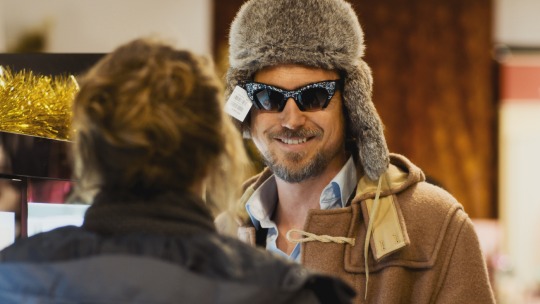
Lars Eidinger [LE] on working with Adèle Haenel
I: Your character experiences an extraordinary love story of great intensity against this background [T: of facing his family’s fascist past]. How was it to work with Adèle Haenel?
LE: With Adèle I always had the feeling that I found my female counterpart. We have similar ideas about acting. Adèle is not the person who plays against another colleague, or who is self-absorbed, on the contrary. Everything she does in the film works through me as partner, and vice versa, everything she takes, she takes out of me. That is absolutely satisfying. It doesn’t mean that it’s absolutely harmonious. There are of course difficulties and moments, where it takes long to find each other. But there was always the same ambition. And that’s why it was possible for us to go into emotionality together, you usually don’t experience it like this at work.
[…]
On the other hand, I must say: I thought that the screenplay was really funny. It was quite a good Litmus-Test, when the driver picked us up at the hotel in the morning, and Adèle and I rehearsed our scenes, and he then cracked up. You actually get a good idea how much comical potential those scenes have.

Jan Josef Liefers [JJL] on Zazie Lindeau and Adèle Haenel
I: How do you see your character of Balthasar Thomas?
JJL: First and foremost, Balthasar loves a madwoman. That speaks in his favour. […] Balthasar loves Zazie, he is also a bit obsessed with her, he is even separating from his wife, but he really has no clue – and that’s his limitation – what’s behind the things that she reveals of herself. She gives him her affection, and her body, and also two, three thoughts – but this is not what this woman is really about. And what this woman is about, what makes her complicated, what makes her so vulnerable, and also hurt, this is something that Balthasar never sees. All of this is only for Toto to see.
I: How was it working with Adèle Haenel?
JJL: Adèle is the kind of person, she just comes along – as Adèle and not as a film star that she is in France – and then goes on to Saxony, to stay with friends for a while and study German. She was really that unpretentious. And incredibly disciplined. Adèle spoke German so well during rehearsals that Chris even asked, it would be nice, if you could maybe say again: [T: Isn’t it? but with a French accent] – because she could almost say Isn’t it? without an accent. Adèle is the kind of person, who likes to laugh and approaches people, who as an actress is very much connected with her counterpart, and only retreats if something is not quite right for her. It’s a special kind of blend of intellect, talent and instinct.

Chris Kraus [CK] about Zazie (and Toto) and Adèle Haenel
I: You just mentioned the aspect of reconciliation in the film. Toto seems quite unforgiving.
CK: Yes, exactly, that’s why it’s so hard for him and the film’s overall goal [T: to attain reconciliation]. Toto doesn’t forgive himself at all. And to punish himself, he also doesn’t forgive other people anything. Punishment is always linked to morals. Of course, morals which failed.
I: What about the character of Zazie, who Toto falls in love with?
CK: Zazie was for me always as traumatised as Toto by her family’s past, but psychologically this manifested differently due to her temper. The destruction in both characters is comparable. That’s what brings them together. Their deficits and trauma. It unites them.
I: Why did you choose Adèle Haenel, who has become such a big star in France?
CK: This was originally the idea of the Casting Director Nina Haun, with whom I did almost all my films together. I met Adèle three years ago, when she was an up-and-coming young actress, not the French super star of today. We were really lucky that she wanted to be part of a German film for personal reasons, to explore her German-Austrian roots.
I: How is it that Adèle Haenel is almost fluent in German?
CK: It’s quite a miracle. Adèle hardly spoke any German apart from two, three words, when I first met her. But her character really had to speak this language quite well. We planned to give her a language coach, as we did with Tambet Tuisk in ‘Poll’. But Adèle adamantly refused [T: assistance], found it inauthentic and chased the guy off. She told me: ‘Give me three months, and I will speak like Goethe.’ And that’s how it was. She lived in Dresden for a couple of weeks, took a private tutor in Paris, and when she finally arrived in Berlin for the shoot, she was quite chatty and could also swear like the taxi drivers in Berlin. That was quite impressive.
—
Note: CK, LE and JJL also spoke about quite profound topics / themes that the film dealt with (like the Holocaust or the perpetrator-victim dynamic). However, I focused on translating the bits about working with AH here. If you can, please watch the film and let me know if you have further queries about the film / their interviews. I’m not a historian, but I do hope that history (and maybe this film) can teach a lesson or two about the persistent threat of fascism, and the difficulties of reconciliation in the face of past and present atrocities. And yes, this film is also funny, which is quite a feat in this context.
#The Bloom of Yesterday#Die Blumen von gestern#2016#Chris Kraus#Adèle Haenel#Lars Eidinger#Jan-Josef Liefers#German film#My translation#Got a bit heavy at the end#Comedy and tragedy#Two sides of the same coin#No idea why they didn't ask Adèle#about the more serious side#of her character#There are a couple of BTS vids out there#I think these were put as text on the film's website#And someone corrected Adèle's German#How dare#long post
73 notes
·
View notes
Text
Why Aren’t People Writing With Me?
Why aren't people writing with me?
Real talk: do you often find yourself waiting weeks or even months between partners replying to your posts? Do people seem to prioritize all their other threads over yours? Do people seem to be just not that jazzed about writing with you? It's the worst feeling, when you're spinning your wheels and on the outskirts, wondering why you're struggling to gain traction. Sometimes, sites just be like that - people writing with their friends, or closed groups hard for a newer member to break into, or folks writing on slow timelines, or not keeping track of how long they've kept a partner waiting. It comes with the territory. But sometimes, it might be your writing that's holding your threads back. I know what you're thinking:
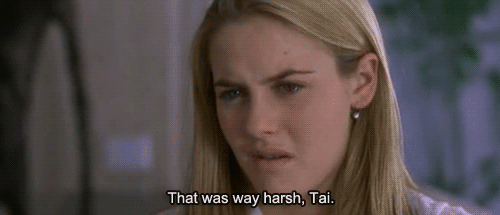
But it's something everyone can genuinely stand to consider, when they're having trouble getting a thread to keep moving: how much of this is my thread partner holding me up, and how much of it is me? Is there anything I can do to keep things moving? No matter how long you've been writing or how advanced a writer you are, it can be easy to forget that writing is ultimately a game of improv, and writing well is only part of the job. Part of the job is setting your partner up for a good time, too.
This tutorial is about writing starters & replies that make your thread partner excited to write back.
We'll be covering:
Starters that stall vs. starters that enthrall (sorry! the rhyme was necessary.)
Common tactics for writing replies - and common pitfalls of them
Alternate approaches to writing replies
Hopefully, these tips and tricks will improve your rp experience - because aren't we all here for a good time?
Onward!
STARTERS
Ah, starters. The bane of every roleplayer's existence. Starters are difficult because they often require some scene-setting, leaving the writer to try to set up a premise and a vibe without powerplaying for their partner. And then, you've got to start the interaction. There's a lot to contend with, so a lot of people avoid starters at all costs.
Personally, I like starting a thread: this way, I'm not waiting on a post; I have control over when it goes up. Thread partners often appreciate you writing a starter for them, so it's an easy way to engender good will. And finally, for me, it lets me make sure the thread is off to a good, actionable start.
Starters come with pressure - the starter sets the tone for the thread. A dud starter will stump your partner on replying, and they may even grow to dread posting. Which isn't fun for either of you!
Some things to consider when crafting a starter that will get your partner excited:
PREMISE Whether you're writing an open thread or a plotted thread for a specific partner, every starter needs a premise. The premise might be simple: perhaps your character is going to pickpocket your partner's. Maybe it's two friends catching up. It could be two strangers bumping into each other in an alley. It might also be more complex: maybe you're setting up an enemies-friends-lovers-enemies-rivals-lovers-friends-enemies plot. Maybe your character is defending the teaching of evolution to schoolchildren before a jury of his peers. Maybe it's a duel.
Generally, the more specific the premise, the better. This doesn't mean you need every beat of the thread plotted out, but it is good to think about: What do we want each character to get out of the thread?
Think of this as your overall goal for the thread. Is one character seeking reassurance or advice? Is there a business transaction being made? Have you and your partner agreed to hurt one character in a duel? If you can't think of an overall goal or point for the thread, the chances of stalling are high. This is common with "catch up" threads, especially ones in which neither character has particularly exciting updates to share. If only one character is "getting something" out of the thread, be careful in your own posts to set up plenty for your partner to respond to. Not every thread will have equal actionable payoff for both characters, which isn't inherently a bad thing. But if your posts don't give your partner much to engage with, the thread can read as selfish or one-sided - which isn't anyone's intention!
How do we want the events of this thread to impact this character, moving forward?
Related to the above, if both characters can walk away from this thread without any change - perhaps reconsider the premise or necessity of your thread. There is no shame in not doing a thread when it wouldn't mean anything to character development or plot progression for either character! "Just because" threads are always the first that drop on thread priorities - why not save yourself the trouble, and plot something you will both be excited about?
What is the most reasonable entrypoint for this thread?
Reality is filled with filler - moments in which nothing interesting happens, but which carry us from point A to point B. Conversation that goes nowhere and just happens for the sake of filling silence. But this isn't reality, this is fiction, which means we can cut the boring stuff and jump straight into the meat. If your premise is Character A pickpocketing Character B, don't open with Character A just wandering around the market, waiting for Character B to wander around the market, so Character A can pickpocket them: close your starter with Character A's hand around Character B's wallet. This gives your thread partner something to respond to (the theft) and in two fewer posts than it would have taken otherwise.
ACTION Dialogue is an engine for plot progression and for character development, and there is nothing quite as satisfying as strong dialogue. But questions, greetings, and other standard ways to launch an in-character conversation aren't your only options.
All a starter needs is action, and saying "hello," "what are you doing," or "hey! That's my pod racer!" are all actions. But actions can be silent, too, so long as they trigger a reaction from your writing partner. Character A pulling their hand out of the butt pocket on Character B's jeans, wallet in hand, begs Character B to react. Character C puking into the same trash can where Character D is searching for the utility bill they need for proof of address gives Character D something to dodge. Character E speedwalking through the grocery store and destroying the greeting card aisle gives Character F something to be horrified at. Even if A, C, and E all do it without saying a word. One thing you'll notice about each of the above premises is that they involve doing something - pickpocketing, puking/dumpster diving, grocery shopping. If you suspect your starters are leaving people underwhelmed, consider building your premise around action. The action doesn't need to be dramatic like the above examples. For instance, let's say that Character G is catching up with Character H after her divorce. They can do this over coffee in Character G's living room - but if they're walking their dogs while Character G's kids are with her ex-husband, you and your partner can use the dogs as emotional stand-ins:
Hannah dug her heels into the ground as Penelope started after a squirrel. Beside her, Gloria and Fifi both seemed not to see it. Hannah had never seen Gloria so out of it, so disconnected from the world around her. It frightened her. "How's Fifi holding up?" she asked, quietly, once Penelope calmed down and they kept walking. "I know Mike wasn't great to her, but - she probably misses the routine?"
Giving the characters some sort of verb to do beyond talking gives you more lenses through which to view an interaction, plus more opportunity for body language for your partner to respond to.
STARTERS: TL;DR Now that we've talked about how to start a thread on the right foot, let's quickly review our main food for thought items. Mind Snacks, if you will:
What do we want to get out of this thread?
Start on track for that result - do not lead with a detour!
Build around action - even small ones
Is the concept of this thread important or interesting? Would we be better served skipping it and writing something else?
REPLIES
Now your thread is off the ground. Excellent! It's a few posts in but your partner doesn't seem very excited - maybe they don't message you about how much they liked your reply, or how fun the thread is so far, or maybe they don't react to the tag in the server; maybe it's radio silence from them until they reply a month and a half later, when they're caught up on the threads they seem to keep shuffling ahead of yours. How do we move your thread up in the shuffle? Make it fun to reply to, and easy to reply to.
COMMON APPROACHES An easy way to tackle a reply is by having your character react to each action and dialogue from your partner's character:
Maycey slid into the navigator's seat of the L2-47 spaceship, almost kicking over a cup of Dark Matter Decaf.
"Sorry," she said, not looking at Brooks. "Are we still checking out Planet 42601, or did General Berry have us change course?" Brooks watched Maycey enter the cockpit, snorting as she almost knocked over his coffee. Though it wouldn't be funny to see what the brew would do to the controls of the L2-47. "No problem," he said. "General Berry wants us to do a pass over 42601, but we aren't doing a full landing."
This reply covers everything Maycey did in her post, but doesn't advance the thread. What comes next? Brooks hasn't given Maycey much information to process, nothing to act on, no juicy body language to consider. Maycey's writer is fully on their own to advance the thread. To move it forward in a meaningful way, they might come up with a plot development they need to run by Brooks's writer to make sure it's not stepping on anything Brooks had planned. They may need to make up some lore. They may need to expand the premise of the thread. Brooks may or may not have helpful input, but when push comes to shove, Maycey is the one who is going to put it in their reply.
Maycey whipped her gaze to her captain, shocked. "But sir - we've come all this way to rescue 42601. Berry - sorry, General Berry wants us to abandon them? Their distress signal took three days to reach us; the atomospheric poisoning has got to be lethal by now." Her hands didn't touch the controls - she couldn't bear to take them off course to the desperate planet. "Sir, we have to do what's right." Brooks took a sip of his coffee, thinking about his own family back on Orbital Sphere 23-Y2K. They'd put out a distress signal years ago, back in his own training days. He'd seen it during radar detection class, and he'd had to ignore it. For the Good of the Galaxy. Not a day goes by that he doesn't think about the flashing signal on his screen, and about clicking the popup window. Dismiss. This, too, is for the Good of the Galaxy. He has to pretend it doesn't bother him. "The right thing is what General Berry says," he said, putting the coffee cup back in its cupholder. "For the Good of the Galaxy."
All of that work from Maycey, and Brooks only gave us one sentence to propel the plot. Yes, he had a lengthy internal monologue debating it - but that interiority means nothing to Maycey, who isn't a mind-reader. In this scenario, the focus on Brooks's tragic backstory, without giving Maycey anything actionable, sets up a very one-sided dynamic. If this happens consistently over one or many threads, the tragic backstory no longer feels tragic in a meaningful way, but just feels like a trite device to be trotted out - to tell rather than show a reader that a character has depth.
How could this post give Maycey more to work off of? Below is the same reply from Brooks, with additions made in green, rearranged wording in blue.
Brooks could feel Maycey's stare - bewildered and accusatory. He can hardly blame her, but she should know by now that this is how the Galaxy stays out of the Great Bezosian Black Hole. Sheer obedience. He avoided her eye contact, took a sip of coffee. Sheer obedience. Just like years ago - back in his own training days. He'd seen it during radar detection class, his own family's distress signal back on Orbital Sphere 23-Y2K, and he'd had to ignore it. For the Good of the Galaxy. Not a day goes by that he doesn't think about the flashing signal on his screen, and about clicking the popup window. Dismiss. This, too, is for the Good of the Galaxy. He has to pretend it doesn't bother him. "The right thing is what General Berry says," he said, putting the coffee cup back in its cupholder - his hands are shaking; it misses the rim twice, sloshes onto the knee of his parasuit. "For the Good of the Galaxy."
This version acknowledges the primary beat of Maycey's post (something we will talk about later) - that is, her accusation - and adds body language betraying his doubts. While interiority is great, externalization makes it possible for other characters to engage with your character's thoughts and motives. Brooks's new post gives Maycey more to engage with, which will better set her up to give Brooks more to engage with, and so on. When you both do the lifting, you both have a better time.
Another common method - especially in conversational threads, especially in "catching up" premises - is to lean on dialogue and, more specifically, questions. But most conversations we have in life aren't nonstop questions!
"Trudy said you got married," Annabelle said, fiddling with the edge of the linen tablecloth. "Is that true? I thought you didn't like Edgar - not like that." Sasha took an enormous bite of raw cucumber, not even bothering to slice it. "We just got engaged, we're not married yet. Don't you like Edgar?" Annabelle looked away, suddenly nervous. She didn't know why it mattered to her whether or not Sasha liked Edgar - only that it did. "He's fine, I guess. But do you like him?" "I do! I love him. Will you be my maid of honor?" Sasha grinned at her friend. She wanted nothing else in the world but for Annabelle to be part of her special day.
This series of posts involves a number of questions both stated in dialogue:
Is Sasha married?
Does Sasha like Edgar?
Does Annabelle like Edgar?
Will Annabelle be Sasha's maid of honor?
And unstated:
Why is Annabelle nervous?
Why does Annabelle care whether or not Sasha likes Edgar?
The stated questions are yes/no questions, somewhat procedural. The unstated question and its implication - that Annabelle cares about whether or not Sasha likes Edgar because she might like Sasha - is a juicier question than the minutiae of wedding planning. But Sasha's writer isn't letting Sasha notice or react to any of Annabelle's body language (her nervousness, her fiddling with the tablecloth) and focuses instead on the simple questions, which are a cover for what isn't being said. Information does not need to be voiced for it to be acted upon. Let's look at the same line of posts, with additions in green for Sasha and in pink for Annabelle.
"Trudy said you got married," Annabelle said, fiddling with the edge of the linen tablecloth. "Is that true? I thought you didn't like Edgar - not like that." Sasha had wondered when Annabelle would ask. She seems on-edge, fiddling with the tablecloth, as though they've never had a picnic outside before. She's not sure why Annabelle is out of sorts, but it's making her feel out of sorts. Sasha took an enormous bite of raw cucumber, not even bothering to slice it. "We just got engaged, we're not married yet. Don't you like Edgar?" She gently grasped Annabelle's fingers, unclenching them from the hem of the tablecloth. "Edgar thinks you're the bee's knees." Sasha's hand on hers - her stomach did a flip, palms instantly feeling clammy, like she could swoon in the summer sun. Annabelle looked away, suddenly nervous. It's worse that Edgar likes her. Makes her feel vile for resenting him like she does. She didn't know why it mattered to her whether or not Sasha liked Edgar - only that it did. "He's fine, I guess. But do you like him?" It's a silly question - of course she loves him; how could she have said yes otherwise? But Annabelle seems not to believe her. Annabelle seems to worry. Annabelle is worried so much of the time - and so much for her - she tries to be reassuring, gripping her friend by the shoulders, offering a grin. "I do! I love him. Will you be my maid of honor?" She wanted nothing else in the world but for Annabelle to be part of her special day. Annabelle is her best friend - the only person she could stand at the altar with besides Edgar.
See how much more complex the dynamic is between these two when they have things to react to other than dialogue?
REPLIES PART 1: TL;DR So now we've addressed two common approaches to replies and seen how they can fall short, and discussed tips for elevating them. Your main takeaways:
Acting is reacting - react to your partner's dialogue AND body language, and give them some to work from, too!
Dialogue is not a game of Questions Only
If you're not driving the thread forward, you're slacking - don't leave it to your partner every time!
SYNTHESIZING: YOUR NEW APPROACH TO WRITING REPLIES
Now that we've discussed the pitfalls of action-by-action responses and dialogue-only threading, let's synthesize all of the above into one methodology for writing replies. The common pitfall of action-by-action responses is that one writer ends up only ever progressing the thread one sentence at a time - thinking of a post in terms of beats helps separate what actually needs substantive response, versus what is background information to inform your response. When I write a reply, I copy and paste my partner's post into the wordcounter window where I write my posts. I read their post and identify the beats - that is, what actually happens. For example:
Getting elected student body president was no joke. Hattie had worked for eleven long years to earn the position - bossed around her peers all the way from preschool. Back then, she'd been interested in power and prestige. But by the time she'd won the election junior year, she was exhausted. Now, on her first day of senior year, she was just excited about the choice parking spot. And yet, someone had the audacity - the nerve - to cut her off on the turn into the Keppler Family Parking Pavilion and slide right into her coveted parking spot. Crooked, so they took up the access lane to the adjoining handicapped spot. Too far forward, enough that she could see the metal RESERVED FOR STUDENT BODY PRESIDENT sign shaking on top of its pole. She threw herself out of her car, aiming the sole of her left Doc Marten into the license plate of the offender's Buick. "Hey, genius, there's no fucking run-off election this year!"
Because this is a starter, much of this is scene setting, which my partner could choose to echo, but the main things for them to react to are what my character - Hattie - offers in the moment:
dramatically throwing herself out of the car
kicking their license plate
swearing at them
Once I've distilled a post to the beats I need to respond to, I work my way through them, creating beats for my partner to respond to. With this method, a reply to the above might look like this:
Aunt Mildred's car was affectionately called The Boat for the first ten years of its life. Huge and unsinkable. That had changed when Aunt Mildred died in a boating accident over the summer, leaving Mikey the Boat's captain. Now, he just called it the Buick. And he wasn't very good at driving it - already he'd been honked at twice, overshot the turn into the parking lot, tires riding up on the curb. He pulled into the first available space. Figured he was outside the lines - but it seemed like the Buick was too wide to fit between lines anyway. And Aunt Mildred had never been one to follow rules. The terrible park job was in her memory. The sound of metal crunching at the back of the car, however, was not. If it's an accident, the Boat - the Buick - always wins, so Mikey gathered his violin case and drawstring backpack from the passenger seat, opened the driver's side door, and slowly got out of the car, turning his beanie backwards as if it mattered while he shuffled in his Adidas slides to the trunk, where a very short, very angry girl driving a Smart Car was trying to put the Boat - the Buick - in its place. "The car's not moving," he said, pulling a roll of Bubble Tape out of his backpack and taking a huge bite out of it. "But thanks for telling me my voting rights."
Mikey responds to Hattie's abuse of his car, but also gives Hattie a lot to respond to - minor dialogue, but a LOT of personal eccentricities that are bound to piss her off.
The dialogue and the action contribute to the trajectory of the thread - and giving Hattie something to play with keeps the musing about Aunt Mildred from feeling self-indulgent.
It's a small shift, going from thinking of posts as paragraphs to respond to to thinking of them as specific, small, actionable moments - but it makes a difference, especially in encouraging writers to be more thoughtful about creating opportunities for their partner to react.
REPLIES PART 2: TL;DR
beats, babey! not every sentence requires a response, but be sure to write some that do, whether it be dialogue or action.
ACTING IS REACTING!!!!!! if you don't give your partner something to react to, you are letting them down!
And that's all there is to it! Hopefully these examples are helpful as you think about ways to drive your plots and threads, and how to keep your own writing great for collaboration. The most important thing is to think of your writing partner. What do they need to be able to write back? What will make this thread exciting for them? How can you make sure this thread isn't serving you alone? Cheers, and happy writing!
#christ this was annoying to format#rp guides#resources#writing resources#rp writing#posts#starters#replies
26 notes
·
View notes